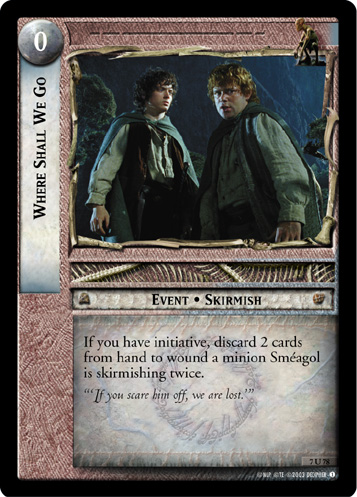User:Cease/Gollum: Difference between revisions
No edit summary |
(→Gollum) |
||
| (8 intermediate revisions by the same user not shown) | |||
| Line 3: | Line 3: | ||
While Gollum and Sméagol are the same character in Lord of the Rings, in this game they are two entirely separate characters, representing Gollum's dualistic, treacherous nature. Cards that mention Gollum by name do not affect Sméagol, and vice versa. Likewise, effects on a copy of one character do not affect the other. If Gollum is wounded, that doesn't hurt Sméagol at all. If Sméagol is in the [[dead pile]], the Free Peoples player can't play any more copies of Sméagol, but the Shadow player can still play Gollum. | While Gollum and Sméagol are the same character in Lord of the Rings, in this game they are two entirely separate characters, representing Gollum's dualistic, treacherous nature. Cards that mention Gollum by name do not affect Sméagol, and vice versa. Likewise, effects on a copy of one character do not affect the other. If Gollum is wounded, that doesn't hurt Sméagol at all. If Sméagol is in the [[dead pile]], the Free Peoples player can't play any more copies of Sméagol, but the Shadow player can still play Gollum. | ||
While Gollum and Sméagol are separate characters, they are both the same {{C|Gollum}} culture. Often, {{C|Gollum}} cards affect cards on both sides. {{Card|Clever Hobbits}} can discard both players' {{CultureIcon|Gollum}} conditions, and indeed it is occasionally included in decks that don't use Sméagol to counter Shadow {{C|Gollum}} decks. {{Card|Not Easily Avoided}} can tutor both Free Peoples and Shadow cards. As long as a card doesn't specify Sméagol or Gollum by name, or require doing playing a {{CultureIcon|Gollum}} card in the [[Fellowship Phase|Fellowship]] or [[Shadow Phase]]s, it generally works on both sides' cards. | While Gollum and Sméagol are separate characters, they are both the same {{C|Gollum}} culture. Often, {{C|Gollum}} cards affect cards on both sides. {{Card|Clever Hobbits}} can discard both players' {{CultureIcon|Gollum}} conditions, and indeed it is occasionally included in decks that don't use Sméagol to counter Shadow {{C|Gollum}} decks. {{Card|Not Easily Avoided}} can tutor both Free Peoples and Shadow cards. As long as a card doesn't specify Sméagol or Gollum by name, or require doing playing a {{CultureIcon|Gollum}} card in the [[Fellowship Phase|Fellowship]] or [[Shadow Phase]]s, it generally works on both sides' cards. Occasionally, cards from other cultures benefit from this interaction: for example, if you're a heartless monster, you can burn Sméagol with {{Card|Saved From The Fire}} to [[tutor]] three Shadow cards to help set up Gollum quickly. | ||
Both sides are good at [[tutor]]ing cards from your deck and [[recur]]ring cards, with cards like {{Card|Evil-Smelling Fens}} and {{Card|Web}}. Early on, this is chiefly limited to Shadow cards and mostly focused on Gollum himself, like {{Card|We Must Have It}}. This becomes more and more of a culture staple in later sets, especially after the [[Shadows]] set, with cards like {{Card|Deagol, Fateful Finder}}, {{Card|Something Slimy}}, {{Card|Incited}}, and {{Card|Sudden Strike}}. Something Slimy, [[download]]ed with {{Card|Dammed Gate-Stream}}, is one of the two main reasons a Sméagol splash is popular in [[Expanded (Format)|Expanded]] Free Peoples decks. | Both sides are good at [[tutor]]ing cards from your deck and [[recur]]ring cards, with cards like {{Card|Evil-Smelling Fens}} and {{Card|Web}}. Early on, this is chiefly limited to Shadow cards and mostly focused on Gollum himself, like {{Card|We Must Have It}}. This becomes more and more of a culture staple in later sets, especially after the [[Shadows]] set, with cards like {{Card|Deagol, Fateful Finder}}, {{Card|Something Slimy}}, {{Card|Incited}}, and {{Card|Sudden Strike}}. Something Slimy, [[download]]ed with {{Card|Dammed Gate-Stream}}, is one of the two main reasons a Sméagol splash is popular in [[Expanded (Format)|Expanded]] Free Peoples decks. | ||
| Line 23: | Line 23: | ||
* {{Card|Smeagol, Slinker}} is a very durable defender who can lose skirmishes over and over for you, albeit at a high cost in burdens. He's only usable in decks with uncommonly good burden removal, but can even be an asset in decks that use {{Card|The Shire Countryside}} to turn burden removal into healing. | * {{Card|Smeagol, Slinker}} is a very durable defender who can lose skirmishes over and over for you, albeit at a high cost in burdens. He's only usable in decks with uncommonly good burden removal, but can even be an asset in decks that use {{Card|The Shire Countryside}} to turn burden removal into healing. | ||
* {{Card|Smeagol, Poor Creature}} can be used to help [[cycle]] by discarding unwanted cards that are [[Hand Clog|clogging]] up your hand. You can even use if Smeagol isn't assigned to a skirmish, as long as someone is. | * {{Card|Smeagol, Poor Creature}} can be used to help [[cycle]] by discarding unwanted cards that are [[Hand Clog|clogging]] up your hand. You can even use his ability if Smeagol isn't assigned to a skirmish, as long as someone is. | ||
* {{Card|Smeagol, Always Helps}} and {{Card|Don't Look at Them}} are very powerful [[direct wounding]] tools. They're both strong on their own or in combination with other direct wounding, and as a [[combo]] they can kill any minion in the game at the cost of two [[Threat|threat]]s and three cards in hand. Often used in [[Rainbow Wounding]]. | * {{Card|Smeagol, Always Helps}} and {{Card|Don't Look at Them}} are very powerful [[direct wounding]] tools. They're both strong on their own or in combination with other direct wounding, and as a [[combo]] they can kill any minion in the game at the cost of two [[Threat|threat]]s and three cards in hand. Often used in [[Rainbow Wounding]]. | ||
* {{Card|Smeagol, Bearer of Great Secrets}} is an odd duck, generally only played in [[Solo Smeagol]] decks as the [[Ring-bearer]]. Sméagol isn't a strong skirmisher, but his Regroup ability makes double moves very safe. The challenge is figuring out how to [[Run|run]] despite the fact that Sméagol kills a companion a turn, or figure out how to run while his only helpers are [[Bilbo]], [[Sam]], {{Card|Frodo, Frenzied Fighter}}, and/or [[Ring-bound]] [[Ranger]]s. | * {{Card|Smeagol, Bearer of Great Secrets}} is an odd duck, generally only played in [[Solo Smeagol]] decks as the [[Ring-bearer]]. Sméagol isn't a strong skirmisher, but his Regroup ability makes double moves very safe. The challenge is figuring out how to [[Run|run]] despite the fact that Sméagol kills a companion a turn, or figure out how to run while his only helpers are [[Bilbo]], [[Sam]], {{Card|Frodo, Frenzied Fighter}}, and/or [[Ring-bound]] [[Ranger]]s. | ||
* {{Card|Smeagol, Simple Stoor}} is another odd duck. He's chiefly useful in {{C|Dwarven}} self-[[mill]] decks that run a huge deck and use cards like {{Card|Ever My Heart Rises}} (helpfully downloaded using {{Card|Dammed Gate-Stream}} and {{Card|Something Slimy}}) to mill most of your cards into the discard pile. If most of your deck is in the discard, then any [[recur]]sion effects basically turn into [[tutor]]s, plus any cards that spot cards in your discard are empowered. Simple Stoor isn't very strong without some way to mill a bunch of copies of Déagol into discard, but once you do, he's a passable skirmisher who helps [[thin]] unneeded {{C|Gollum}} cards out of your deck, as well as empowering himself by milling out {{Card|Softly Up Behind}} or any remaining copies of {{Card|Deagol, Fateful Finder}}. (There's a Shadow equivalent of Simple Stoor, {{Card|Gollum, Her Sneak}}, but it isn't as good because its strength is capped.) | * {{Card|Smeagol, Simple Stoor}} is another odd duck. He's chiefly useful in {{C|Dwarven}} self-[[mill]] decks that run a huge deck and use cards like {{Card|Ever My Heart Rises}} (helpfully downloaded using {{Card|Dammed Gate-Stream}} and {{Card|Something Slimy}}) to mill most of your cards into the discard pile. If most of your deck is in the discard, then any [[recur]]sion effects basically turn into [[tutor]]s, plus any cards that spot cards in your discard are empowered. Simple Stoor isn't very strong without some way to mill a bunch of copies of Déagol into discard, but once you do, he's a passable skirmisher who helps [[thin]] unneeded {{C|Gollum}} cards out of your deck, as well as empowering himself by milling out {{Card|Softly Up Behind}} or any remaining copies of {{Card|Deagol, Fateful Finder}}. (There's a Shadow equivalent of Simple Stoor, {{Card|Gollum, Her Sneak}}, but it isn't as good because its strength is capped.) | ||
* {{Card|Don't Follow The Lights}} is only rarely worth it when played "fairly" by winning a skirmish with higher strength, but it can be a powerful supplement to a [[direct wounding]] strategy. As long as you kill whoever Sméagol is skirmishing after assignment but before the end of that skirmish, you can use this to pick off another minion at a very low cost. This is particularly great as a supplement for {{Card|Always Helps}}/{{Card|Don't Look At Them}}. | |||
* {{Card|Follow Smeagol}} and {{Card|One Good Turn Deserves Another}} are staples in post-[[Shadows]] [[format]]s. [[Site Manipulation|site manipulation]] is a powerful offensive and defensive tool in those formats, and Sméagol is relatively easy to add to your deck to control the site path. ({{Card|Still Far Ahead}} is a cheaper, one-time alternative along these lines, occasionally played in unofficial formats where those two are banned.) | * {{Card|Follow Smeagol}} and {{Card|One Good Turn Deserves Another}} are staples in post-[[Shadows]] [[format]]s. [[Site Manipulation|site manipulation]] is a powerful offensive and defensive tool in those formats, and Sméagol is relatively easy to add to your deck to control the site path. ({{Card|Still Far Ahead}} is a cheaper, one-time alternative along these lines, occasionally played in unofficial formats where those two are banned.) | ||
* {{Card|Clever Hobbits}} is a card with two functions. The first, and most obvious, is a middling-quality [[pump]] for Sméagol himself. It's nice that it's uncapped, but it comes at a high price when you're discarding your own conditions. However, it can also discard your opponent's {{CultureIcon|Gollum}} conditions, even if you don't have Sméagol in play. It's even occasionally played in decks that don't use him at all, as [[tech]] against [[Ninja Gollum]] Shadow decks. | * {{Card|Clever Hobbits}} is a card with two functions. The first, and most obvious, is a middling-quality [[pump]] for Sméagol himself. It's nice that it's uncapped, but it comes at a high price when you're discarding your own conditions. However, it can also discard your opponent's {{CultureIcon|Gollum}} conditions, even if you don't have Sméagol in play. It's even occasionally played in decks that don't use him at all, as [[tech]] against [[Ninja Gollum]] Shadow decks. | ||
| Line 35: | Line 36: | ||
{{Card|Secret Paths}} is a strong [[Move Limit]] card, similar to {{Card|Final Throw}}. It's only useful in decks that are running Sméagol already or [[Format|formats]] that don't include [[Reflections]], because if you want to splash a single out-of-culture minion to get +1 move limit, you can play {{Card|Radagast, The Brown}}. | {{Card|Secret Paths}} is a strong [[Move Limit]] card, similar to {{Card|Final Throw}}. It's only useful in decks that are running Sméagol already or [[Format|formats]] that don't include [[Reflections]], because if you want to splash a single out-of-culture minion to get +1 move limit, you can play {{Card|Radagast, The Brown}}. | ||
{{Card|where shall we go}}? | |||
{{Card|Deagol, Fateful Finder}} is a powerful tool to [[download]] artifacts or possessions onto your characters, and it can in turn be downloaded by {{Card|Erkenbrand's Horn}}. This is a common combo in [[Horn Filter]], helping to set up your other characters more quickly. The chief weakness of this strategy is that having so many different cultures in your deck will make you vulnerable to [[Rainbow]] [[hate]] like {{Card|Grima, Chief Counselor}}, although this can be alleviated somewhat by discarding Déagol using his game text and killing off Sméagol. | {{Card|Deagol, Fateful Finder}} is a powerful tool to [[download]] artifacts or possessions onto your characters, and it can in turn be downloaded by {{Card|Erkenbrand's Horn}}. This is a common combo in [[Horn Filter]], helping to set up your other characters more quickly. The chief weakness of this strategy is that having so many different cultures in your deck will make you vulnerable to [[Rainbow]] [[hate]] like {{Card|Grima, Chief Counselor}}, although this can be alleviated somewhat by discarding Déagol using his game text and killing off Sméagol. | ||
| Line 45: | Line 48: | ||
{{Card|Something Slimy}} can tutor one [[condition]] of any culture, and can downloaded with {{Card|Dammed Gate-Stream}}. It's great for setting up any deck that relies heavily on one particular condition, as with {{Card|Stewards' Legacy}} or {{C|Dwarven}} self-[[mill]] decks using {{Card|Ever My Heart Rises}}, or for any deck with many powerful conditions. Note that this cannot be used on Shadow cards, as it requires playing the card in the Fellowship Phase. | {{Card|Something Slimy}} can tutor one [[condition]] of any culture, and can downloaded with {{Card|Dammed Gate-Stream}}. It's great for setting up any deck that relies heavily on one particular condition, as with {{Card|Stewards' Legacy}} or {{C|Dwarven}} self-[[mill]] decks using {{Card|Ever My Heart Rises}}, or for any deck with many powerful conditions. Note that this cannot be used on Shadow cards, as it requires playing the card in the Fellowship Phase. | ||
= Shadow = | = Shadow = | ||
| Line 58: | Line 59: | ||
* {{Card|Gollum, Stinker}} is one of the highest-strength versions of Gollum, and fits well into any deck that places burdens, like [[Corruption]] decks or [[Beasterlings]]. Most versions of Gollum aren't going to win many skirmishes, but this is one of the exceptions. | * {{Card|Gollum, Stinker}} is one of the highest-strength versions of Gollum, and fits well into any deck that places burdens, like [[Corruption]] decks or [[Beasterlings]]. Most versions of Gollum aren't going to win many skirmishes, but this is one of the exceptions. | ||
* {{Card|Gollum, Old Villain}} is a very consistent card, even if its power ceiling isn't all that high. It poses a dilemma for the Free Peoples player: even if you don't have any other [[Pump|pumps]] for Gollum, his strength could be as much 5 plus your current hand size. It probably won't be, but who wants to take that chance? Even if you're not concerned with winning a skirmish with Gollum at the moment, Old Villain can [[cycle]] unwanted cards to clear up a [[Hand Clog|clogged hand]], making your whole deck more consistent. | * {{Card|Gollum, Old Villain}} is a very consistent card, even if its power ceiling isn't all that high. It poses a dilemma for the Free Peoples player: even if you don't have any other [[Pump|pumps]] for Gollum, his strength could be as much 5 plus your current hand size. It probably won't be, but who wants to take that chance? Even if you're not concerned with winning a skirmish with Gollum at the moment, Old Villain can [[cycle]] unwanted cards to clear up a [[Hand Clog|clogged hand]], making your whole deck more consistent. | ||
* {{Card|Gollum, Plotting Deceiver}} is not a strong minion. However, in decks with Shadow cards that seize [[Initiative]] like {{Card|Corsair War Galley}}, it means you can play Gollum over and over without any other support. He can just be another minion as part of a [[swarm]], a consistent source of threats from {{Card|Fat One Wants It}}, or you can just be sure Gollum is play for cards that spot or exert him. | * {{Card|Gollum, Plotting Deceiver}} is not a strong minion. However, in decks with Shadow cards that seize [[Initiative]] like {{Card|Corsair War Galley}}, it means you can play Gollum over and over without any other support. He can just be another minion as part of a [[swarm]], a consistent source of threats from {{Card|Fat One Wants It}}, or you can just be sure Gollum is in play for cards that spot or exert him. | ||
* {{Card|Gollum, Vile Creature}} eats [[threat]]s to win skirmishes. {{Card|Captured By The Ring}} and {{Card|Fat One Wants It}} can generate the threats, and with a decent pool of threats, this is one of the few Gollums that can be counted on to win skirmishes. | * {{Card|Gollum, Vile Creature}} eats [[threat]]s to win skirmishes. {{Card|Captured By The Ring}} and {{Card|Fat One Wants It}} can generate the threats, and with a decent pool of threats, this is one of the few Gollums that can be counted on to win skirmishes. | ||
* {{Card|Gollum, Dark as Darkness}} is a utility knife. You'll never feel bad playing Dark as Darkness, since he can come down and exert the [[Ring-bearer]] right away. If he survives his skirmish, he can instead wound the Ring-bearer in the Regroup phase. If they don't have one of the versions of [[The One Ring]] that allows them to put it on as a '''Response:''' ability, that can steal wins right out from under your opponent's nose. | * {{Card|Gollum, Dark as Darkness}} is a utility knife. You'll never feel bad playing Dark as Darkness, since he can come down and exert the [[Ring-bearer]] right away. If he survives his skirmish, he can instead wound the Ring-bearer in the Regroup phase. If they don't have one of the versions of [[The One Ring]] that allows them to put it on as a '''Response:''' ability, that can steal wins right out from under your opponent's nose. | ||
* {{Card|Gollum, Mad Thing}} is occasionally useful, but mostly relies on your opponent to make a misplay. Your opponent gets to choose: allow Gollum to skirmish whoever he wants at strength 5 (which is almost always a bad choice), Gollum skirmishes as a normal strength 8 minion, or your opponent places a burden. This is okay in the early game if you have some way to take advantage of your opponent just eating the burden, but a strength 8 minion is rarely a big deal. | * {{Card|Gollum, Mad Thing}} is occasionally useful, but mostly relies on your opponent to make a misplay. Your opponent gets to choose: allow Gollum to skirmish whoever he wants at strength 5 (which is almost always a bad choice), Gollum skirmishes as a normal strength 8 minion, or your opponent places a burden. This is okay in the early game if you have some way to take advantage of your opponent just eating the burden, but a strength 8 minion is rarely a big deal. He does have some nice synergy with {{Card|Hidden Even From Her}}, since giving him '''Fierce''' means he gets the strength bonus twice for the fierce skirmish. On the other hand, he has ''anti''-synergy with {{Card|Reclaim the Precious}}, since he only gets his strength bonus if the Free Peoples player is assigning him to a skirmish. | ||
* {{Card|Gollum, Skulker}} is a general-purpose Gollum that [[pump]]s another minion. The effect isn't particularly strong, and this Gollum will almost always lose his own skirmish, but '''[[Lurker]]''' means he can cheaply buff another minion then get recycled with one of the many {{C|Gollum}} recursion cards. | * {{Card|Gollum, Skulker}} is a general-purpose Gollum that [[pump]]s another minion. The effect isn't particularly strong, and this Gollum will almost always lose his own skirmish, but '''[[Lurker]]''' means he can cheaply buff another minion then get recycled with one of the many {{C|Gollum}} recursion cards. | ||
* {{Card|Gollum, Hopeless}} is occasionally useful against alternate [[Ring-bearer]]s with higher base strength, decks that stack strength-boosters on the Ring-bearer, and {{Card|The One Ring, Such A Weight to Carry}}, but it's not very reliable. It's mainly played as a one-of, because it's so easy to search your deck or discard for a Gollum of your choice. | * {{Card|Gollum, Hopeless}} is occasionally useful against alternate [[Ring-bearer]]s with higher base strength, decks that stack strength-boosters on the Ring-bearer, and {{Card|The One Ring, Such A Weight to Carry}}, but it's not very reliable. It's mainly played as a one-of, because it's so easy to search your deck or discard for a Gollum of your choice. | ||
| Line 67: | Line 68: | ||
===Shelob=== | ===Shelob=== | ||
* {{Card|Shelob, Eater of Light}} isn't the strongest version of Shelob, but she can [[download]] {{Card|Web}} for later use. (She can also download {{Card|Larder}}, which | * {{Card|Shelob, Eater of Light}} isn't the strongest version of Shelob, but she can [[download]] {{Card|Web}} for later use. (She can also download {{Card|Larder}} and {{Card|Spider Poison}}, both of which are rarely played.) | ||
* {{Card|Shelob, Her Ladyship}} is the strongest version of Shelob. She shuts down your opponent's strongest skirmisher, hard counters [[archery]], and, like all [[Enduring]] minions, gets a strength boost from any random cards that exert her or wound her to generate a benefit. (She's best buds with {{Card|Gothmog, Morgul Leader}}, and she loves to vacation in {{Card|Pelennor Prairie}}, {{Card|Osgiliath Crossing}}, or {{Card|Dol Guldur}}.) Along with Gollum himself, she's the star of [[Ninja Gollum]]. | * {{Card|Shelob, Her Ladyship}} is the strongest version of Shelob. She shuts down your opponent's strongest skirmisher, hard counters [[archery]], and, like all [[Enduring]] minions, gets a strength boost from any random cards that exert her or wound her to generate a benefit. (She's best buds with {{Card|Gothmog, Morgul Leader}}, and she loves to vacation in {{Card|Pelennor Prairie}}, {{Card|Osgiliath Crossing}}, or {{Card|Dol Guldur}}.) Along with Gollum himself, she's the star of [[Ninja Gollum]]. | ||
| Line 73: | Line 74: | ||
* {{Card|We Must Have It}} and {{Card|Captured By The Ring}} [[download]] or [[recur]] Gollum, as needed, and can be thought of as extra copies of Gollum in your deck. Plus, because they let you pick which version of Gollum you want to use, you can include multiple different versions for different situations. {{Card|So Polite}} is similar but rarely played, since it [[Hand Clog|clogs up your hand]] if Gollum isn't in your discard pile, and only works in threat decks, which are generally already playing Captured By The Ring and {{Card|Fat One Wants It}}. | * {{Card|We Must Have It}} and {{Card|Captured By The Ring}} [[download]] or [[recur]] Gollum, as needed, and can be thought of as extra copies of Gollum in your deck. Plus, because they let you pick which version of Gollum you want to use, you can include multiple different versions for different situations. {{Card|So Polite}} is similar but rarely played, since it [[Hand Clog|clogs up your hand]] if Gollum isn't in your discard pile, and only works in threat decks, which are generally already playing Captured By The Ring and {{Card|Fat One Wants It}}. | ||
* {{Card|Evil-Smelling Fens}} can [[recur]] any minion of any culture. It's strong in any deck that plans to play Gollum over and over, but especially strong in decks that [[mill]] themselves. However, it does not work well with {{Card|Gollum, Dark as Darkness}}, who wants to exert himself for a different effect. With a large discard pile, this lets you [[tutor]] out any [[Magic Bullet|magic bullet]] minion against your opponents' deck, making narrowly situational [[hate]] cards much more useful. This also makes every site into a [[Marsh]] with no [[Cultural Enforcement|cultural enforcement]], so it's a key card in making the [[Moria Tentacles]] deck work, even if that deck isn't running Gollum himself. | * {{Card|Evil-Smelling Fens}} can [[recur]] any minion of any culture. It's strong in any deck that plans to play Gollum over and over, but especially strong in decks that [[mill]] themselves. However, it does not work well with {{Card|Gollum, Dark as Darkness}}, who wants to exert himself for a different effect. With a large discard pile, this lets you [[tutor]] out any [[Magic Bullet|magic bullet]] minion against your opponents' deck, making narrowly situational [[hate]] cards much more useful. This also makes every site into a [[Marsh]] with no [[Cultural Enforcement|cultural enforcement]], so it's a key card in making the [[Moria Tentacles]] deck work, even if that deck isn't running Gollum himself. | ||
* {{Card|Let Her Deal With Them}} is a self-[[recur]]ring way to buff minions, especially '''[[fierce]]''' minions like {{Card|Shelob, Her Ladyship}}. It's popular in [[Ninja Gollum]], as '''[[Damage]] +1''' is in turn basically doubled by {{Card|Promise Keeping}}, but it also works well in {{C|Sauron}} or {{C|Raider}} decks that seize [[Initiative]]. It also works well with {{Card|Gollum, Plotting Deceiver}}, although you'll probably want to play the condition itself on a stronger minion. | * {{Card|Let Her Deal With Them}} is a self-[[recur]]ring way to buff minions, especially '''[[fierce]]''' minions like {{Card|Shelob, Her Ladyship}}. It's popular in [[Ninja Gollum]], as '''[[Damage]] +1''' is in turn basically doubled by {{Card|Promise Keeping}} when it kills someone, but it also works well in {{C|Sauron}} or {{C|Raider}} decks that seize [[Initiative]]. It also works well with {{Card|Gollum, Plotting Deceiver}}, although you'll probably want to play the condition itself on a stronger minion. | ||
* {{Card|Web}} is one of the few tools that can [[recur]] Shelob (although Gollum can come along too, of course), and can be downloaded by {{Card|Shelob, Eater of Light}}. The only reason to stack orcs on it is to buff {{Card|Shelob, Eater of Light}} or occasionally prevent triggers that happen when a minion is discarded, as with {{Card|Mordor Guard}}. ({{C|Isengard}} orcs like {{Card|Isengard Tender}} don't have any particular synergy with Web.) | * {{Card|Web}} is one of the few tools that can [[recur]] Shelob (although Gollum can come along too, of course), and can be downloaded by {{Card|Shelob, Eater of Light}}. The only reason to stack orcs on it is to buff {{Card|Shelob, Eater of Light}} or occasionally prevent triggers that happen when a minion is discarded, as with {{Card|Mordor Guard}}. ({{C|Isengard}} orcs like {{Card|Isengard Tender}} don't have any particular synergy with Web.) | ||
* {{Card|Sudden Strike}} is expensive, but very powerful, especially with a deck full of [[Magic Bullet]] minions to counter specific Free Peoples strategies. The latter half of the card is only occasionally useful. | * {{Card|Sudden Strike}} is expensive, but very powerful, especially with a deck full of [[Magic Bullet]] minions to counter specific Free Peoples strategies. The latter half of the card is only occasionally useful. | ||
| Line 100: | Line 101: | ||
* {{Card|Cunningly Hidden}} is part of a [[cycle]] of similar [[pump]] events, but notable in that, like {{Card|Naked Waste}}, it can remove both Free Peoples and Shadow {{C|Gollum}} culture cards to pay for [[recur]]ring it. | * {{Card|Cunningly Hidden}} is part of a [[cycle]] of similar [[pump]] events, but notable in that, like {{Card|Naked Waste}}, it can remove both Free Peoples and Shadow {{C|Gollum}} culture cards to pay for [[recur]]ring it. | ||
* {{Card|Deceit}} protects your other Shadow {{CultureIcon|Gollum}} conditions from being discarded. It can't protect itself, although with two copies in play, they can protect each other. (Note that the [[PC Errata]] makes Deceit unique, as well as more expensive to use.) Any card that generates at least one Twilight and discards one condition, like {{Card|Secret Sentinels}} or {{Card|Company of Archers}}, is helpless against it. {{C|Gandalf}} culture condition sweepers like {{Card|Sleep, Caradhras}}, {{Card|Grown Suddenly Tall}}, and especially {{Card|Deep In Thought}} only discard a few of your least-useful conditions at best. Cards that persist in play, like {{Card|Galadriel, Lady Redeemed}}, {{Card|Namarie}}, and {{Card|Bilbo, Well-Spoken Gentlehobbit}} can sometimes work against Deceit, depending on how you manage your Twilight. Deceit also can't protect against sites that discard conditions or cards that remove conditions from play without discarding them, like {{Card|Vilya}} and {{Card|Gladden Homestead}}. | * {{Card|Deceit}} protects your other Shadow {{CultureIcon|Gollum}} conditions from being discarded. It can't protect itself, although with two copies in play, they can protect each other. (Note that the [[PC Errata]] makes Deceit unique, as well as more expensive to use.) Any card that generates at least one Twilight and discards one condition, like {{Card|Secret Sentinels}} or {{Card|Company of Archers}}, is helpless against it. {{C|Gandalf}} culture condition sweepers like {{Card|Sleep, Caradhras}}, {{Card|Grown Suddenly Tall}}, and especially {{Card|Deep In Thought}} only discard a few of your least-useful conditions at best. Cards that persist in play, like {{Card|Galadriel, Lady Redeemed}}, {{Card|Namarie}}, and {{Card|Bilbo, Well-Spoken Gentlehobbit}} can sometimes work against Deceit, depending on how you manage your Twilight. Deceit also can't protect against sites that discard conditions or cards that remove conditions from play without discarding them, like {{Card|Vilya}} and {{Card|Gladden Homestead}}. | ||
= Notable sites = | |||
site manipulation, mention the nasty sites | |||
== King Block == | |||
* {{Card|City of the Dead}} is one of the few cards that can [[tutor]] or [[recur]] [[Shelob]], albeit at a fairly high price. | |||
* {{Card|Northern Ithilien}} [[recur]]s Gollum and places some [[burden]]s, at the low price of a few [[threat]]s. If you have {{Card|Fat One Wants It}} out, one of those threats will be replaced immediately anyway. There's also a [[Corruption|corruption]] [[bomb]] [[Combo|combo]] possible using this site. Play {{Card|Evil-Smelling Fens}}, stack up threats, then any version of Gollum at this site (ideally using the site's text). If you don't already have threats stacked, {{Card|Plotting}} can help. Then, play {{Card|Watcher in the Water, Keeper of Westgate}}, which will discard Gollum. (A second copy of Evil-Smelling Fens can help pull the Watcher out of your discard pile.) At this point, play Gollum over and over using the site's text, placing two burdens and immediately discarding Gollum each time. This combo can stack up as many burdens as you can get threats, usually up to the size of the Fellowship. | |||
== Post-Shadows == | |||
* {{Card|Dammed Gate-stream}} allows cards using Sméagol to quickly set up using {{Card|One Good Turn Deserves Another}} or {{Card|Something Slimy}}. | |||
* {{Card|Mere of Dead Faces}} helps {{C|Gollum}} decks on either side [[Site Manipulation|manipulate the site path]]. | |||
* {{Card|Dol Guldur}} is culture-agnostic [[Condition Removal|condition removal]] for your Shadow side. One thing {{C|Gollum}} culture entirely lacks is condition removal. | |||
* {{Card|Foot of Mount Doom}} harshly punishes Gollum decks that rely on [[recur]]ring key cards over and over. Don't let your opponent toss key cards or your copies of Gollum into the fire if you can avoid it. | |||
---- | ---- | ||
{{Culture Table}} | {{Culture Table}} | ||
Latest revision as of 02:53, 17 March 2022
Gollum culture is the only culture that has both Free Peoples and Shadow cards. It first appears in Battle of Helm's Deep, the second set in Towers Block. Each side is focused on one half of Gollum's personality: helpful but difficult-to-manage Smeagol companion for Free Peoples, and persistant Gollum minion, always turning up like a bad penny for the Shadow.
Gollum culture only includes three characters. Sméagol, Gollum, and, for Shadow only, Shelob, a monstrous spider minion. As a result, both sides are mainly splash cultures, working as an addition to a deck that uses cards from other cultures, particularly by tutoring key cards. Good Sméagol always helps!
While Gollum and Sméagol are the same character in Lord of the Rings, in this game they are two entirely separate characters, representing Gollum's dualistic, treacherous nature. Cards that mention Gollum by name do not affect Sméagol, and vice versa. Likewise, effects on a copy of one character do not affect the other. If Gollum is wounded, that doesn't hurt Sméagol at all. If Sméagol is in the dead pile, the Free Peoples player can't play any more copies of Sméagol, but the Shadow player can still play Gollum.
While Gollum and Sméagol are separate characters, they are both the same Gollum culture. Often,
Gollum cards affect cards on both sides. Clever Hobbits (7U54)
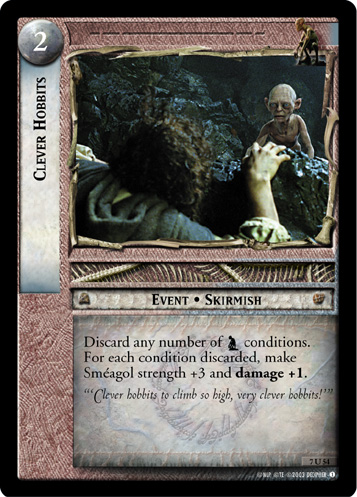 can discard both players'
can discard both players' conditions, and indeed it is occasionally included in decks that don't use Sméagol to counter Shadow
Gollum decks. Not Easily Avoided (18R32)
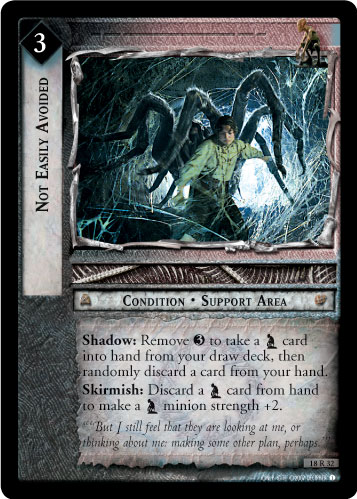 can tutor both Free Peoples and Shadow cards. As long as a card doesn't specify Sméagol or Gollum by name, or require doing playing a
can tutor both Free Peoples and Shadow cards. As long as a card doesn't specify Sméagol or Gollum by name, or require doing playing a card in the Fellowship or Shadow Phases, it generally works on both sides' cards. Occasionally, cards from other cultures benefit from this interaction: for example, if you're a heartless monster, you can burn Sméagol with Saved From the Fire (8R20)
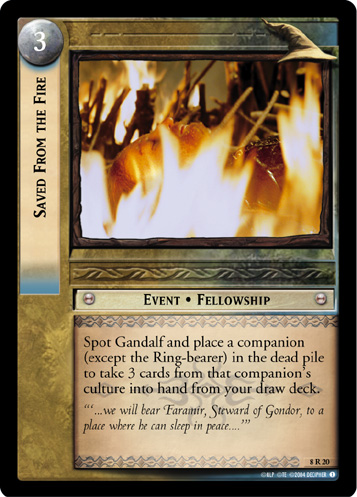 to tutor three Shadow cards to help set up Gollum quickly.
to tutor three Shadow cards to help set up Gollum quickly.
Both sides are good at tutoring cards from your deck and recurring cards, with cards like Evil-smelling Fens (5U22)
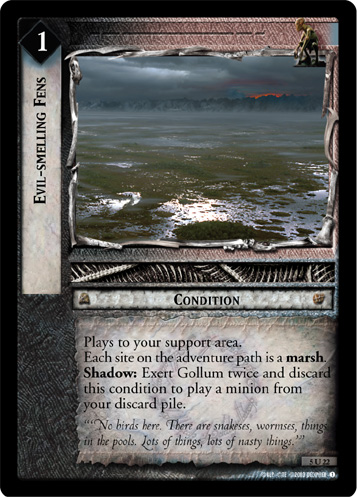 and Web (8C30)
and Web (8C30)
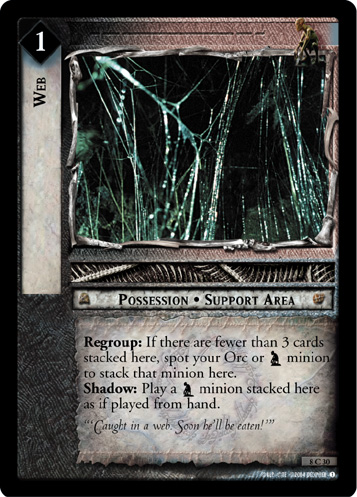 . Early on, this is chiefly limited to Shadow cards and mostly focused on Gollum himself, like We Must Have It (5C30)
. Early on, this is chiefly limited to Shadow cards and mostly focused on Gollum himself, like We Must Have It (5C30)
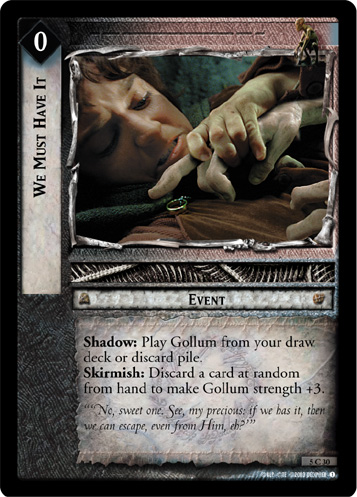 . This becomes more and more of a culture staple in later sets, especially after the Shadows set, with cards like Déagol, Fateful Finder (13R46)
. This becomes more and more of a culture staple in later sets, especially after the Shadows set, with cards like Déagol, Fateful Finder (13R46)
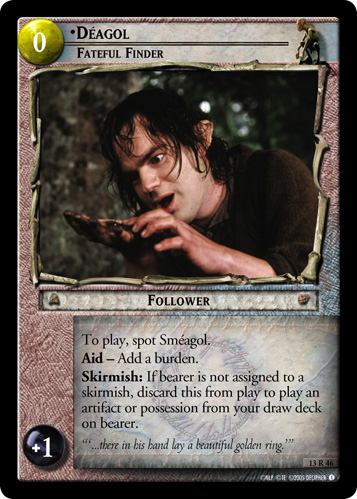 , Something Slimy (15U50)
, Something Slimy (15U50)
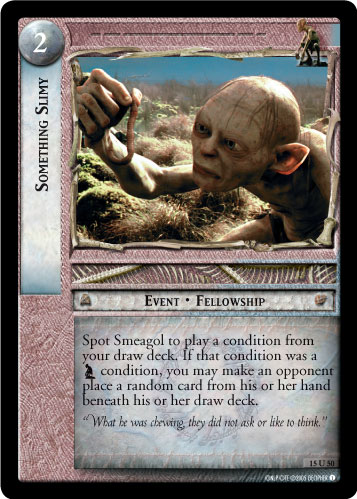 , Incited (11R44)
, Incited (11R44)
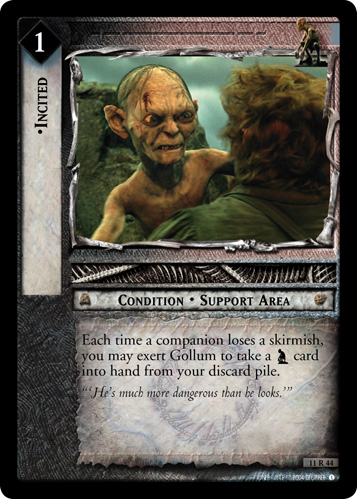 , and Sudden Strike (15U51)
, and Sudden Strike (15U51)
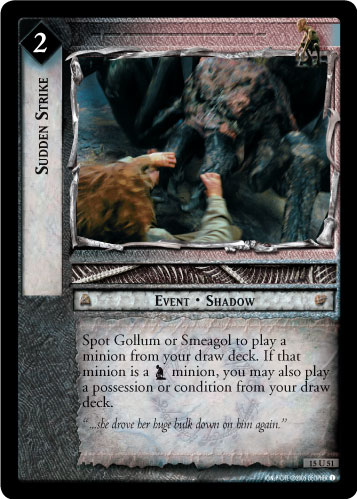 . Something Slimy, downloaded with Dammed Gate-stream (11U235)
. Something Slimy, downloaded with Dammed Gate-stream (11U235)
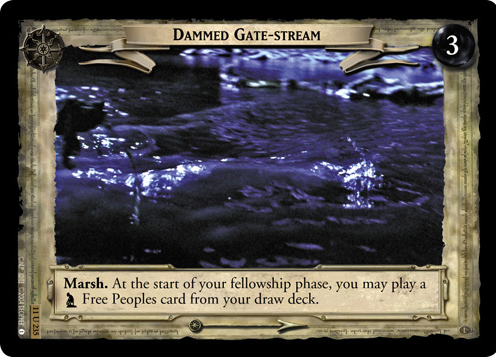 , is one of the two main reasons a Sméagol splash is popular in Expanded Free Peoples decks.
, is one of the two main reasons a Sméagol splash is popular in Expanded Free Peoples decks.
Many Gollum cards punish your opponent for simply skirmishing with Sméagol or Gollum, or allowing him to win a skirmish. Oftentimes this takes the form of direct wounding in the Skirmish Phase, as with Don’t Look at Them (6R39)
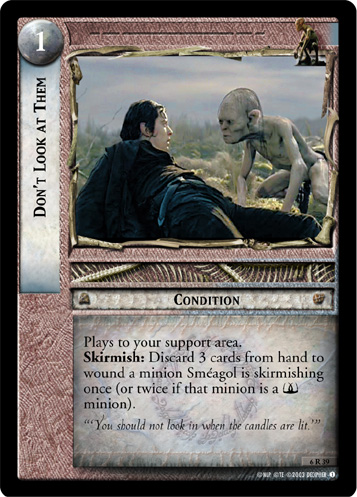 or They Stole It (6R46)
or They Stole It (6R46)
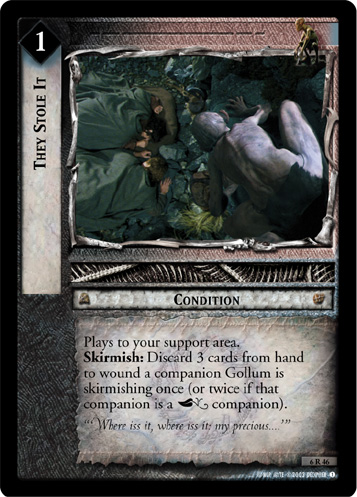 , or cards that trigger after he wins a skirmish, as with Not Listening (6C43)
, or cards that trigger after he wins a skirmish, as with Not Listening (6C43)
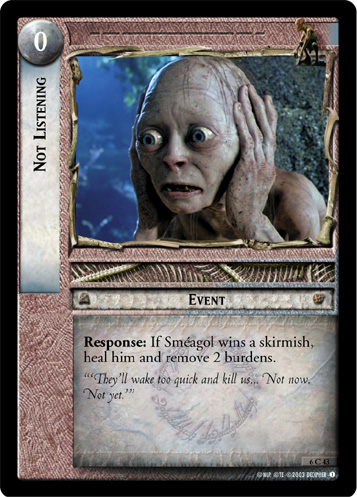 or You’re a Liar and a Thief (6C47)
or You’re a Liar and a Thief (6C47)
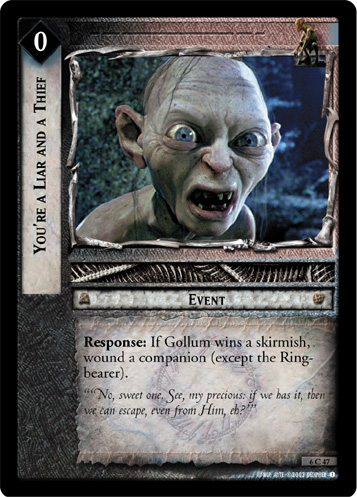 . The skirmish-phase direct wounding is such a powerful effect that there's a whole deck archetype that takes advantage of it: Ninja Gollum.
. The skirmish-phase direct wounding is such a powerful effect that there's a whole deck archetype that takes advantage of it: Ninja Gollum.
Gollum culture is also good at site manipulation, which becomes very important after Shadows changes the way the site path works. Follow Sméagol (5U23)
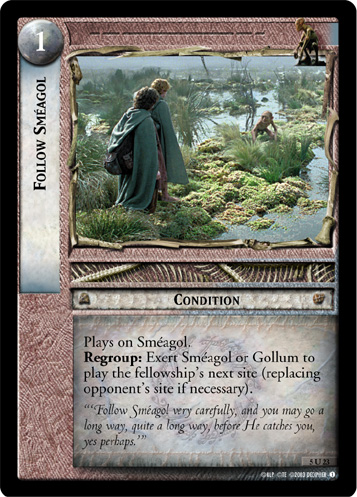 and One Good Turn Deserves Another (11U49)
and One Good Turn Deserves Another (11U49)
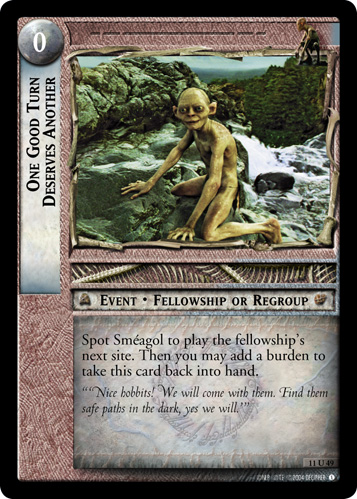 are powerful, reusable tools to rearrange the site path, and together are the other reason Sméagol is an Expanded Free People staple. Led Astray (11U45)
are powerful, reusable tools to rearrange the site path, and together are the other reason Sméagol is an Expanded Free People staple. Led Astray (11U45)
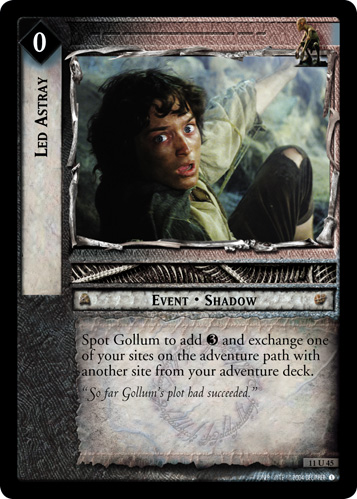 is another powerful site manipulation tool, this time on the Shadow side.
is another powerful site manipulation tool, this time on the Shadow side.
Free Peoples[edit]
Sméagol is mainly played as a supplement to your main strategy. Free Peoples Gollum cards chiefly offer strong tutoring and site manipulation, as well as some direct wounding and filter. Plus, Sméagol himself is a "free" companion for your starting Fellowship: he always fits in, as long as you're willing to accept a burden for the privilege. Even if you aren't using him for anything else, starting Sméagol filters one Free Peoples card out of your deck and can be suicided into at least one skirmish.
As a character, Sméagol is generally a poor skirmisher, and any plan to skirmish with him probably accounts for him losing most of his skirmishes (as with Sméagol, Slinker (5R29)
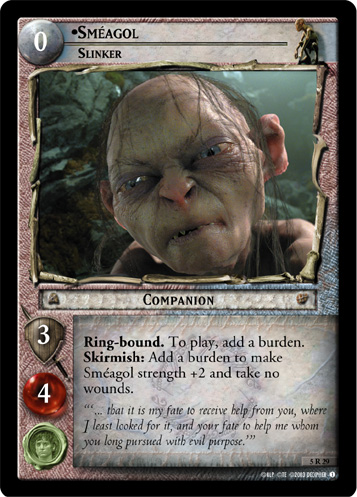 ) or kills any minion he's skirmishing before the skirmish completes (with Sméagol, Always Helps (7R71)
) or kills any minion he's skirmishing before the skirmish completes (with Sméagol, Always Helps (7R71)
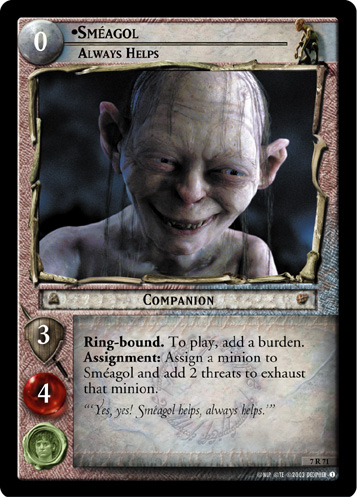 or Don’t Look at Them (6R39)
or Don’t Look at Them (6R39)
 ). He doesn't have access to any typical possessions to help him skirmish like hand weapons, relying on pumps and ersatz solutions like Poor Wretch (5C27)
). He doesn't have access to any typical possessions to help him skirmish like hand weapons, relying on pumps and ersatz solutions like Poor Wretch (5C27)
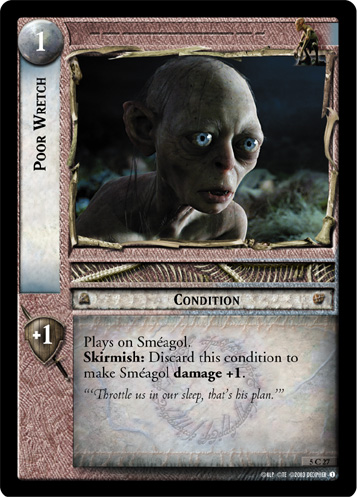 and There’s Another Way (12C40)
and There’s Another Way (12C40)
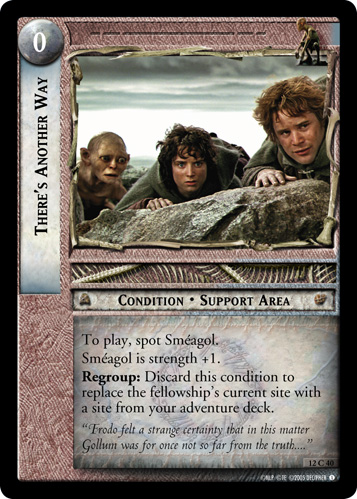 . The only possession Sméagol can bear is Fishing Boat (13R48)
. The only possession Sméagol can bear is Fishing Boat (13R48)
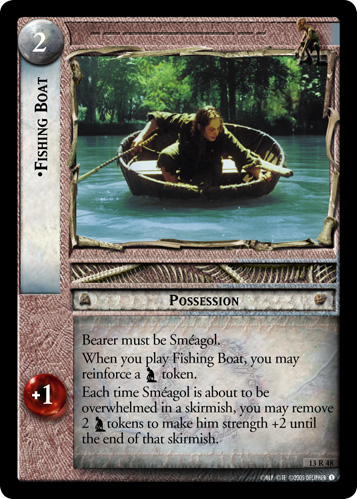 .
.
As with Shire culture, a number of cards discard Sméagol to accomplish some effect (e.g. Be Back Soon (5R21)
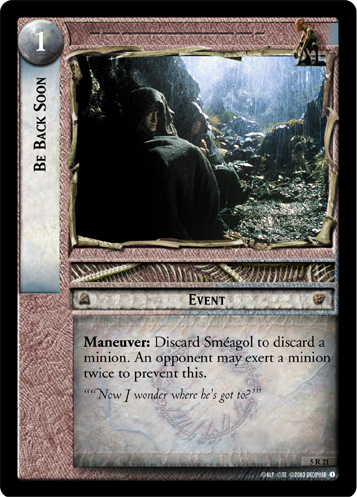 ) or negate a skirmish after it has been assigned (e.g. The Dead City (7R56)
) or negate a skirmish after it has been assigned (e.g. The Dead City (7R56)
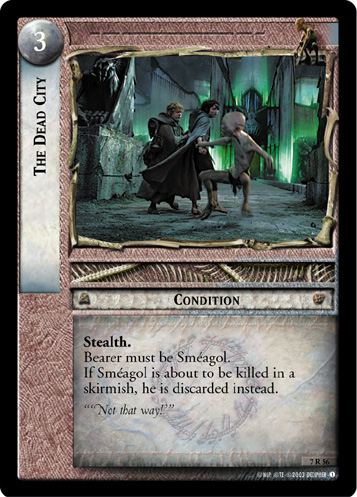 ). He has some recursion to come back into play from discard, as with You Must Help Us (5C117)
). He has some recursion to come back into play from discard, as with You Must Help Us (5C117)
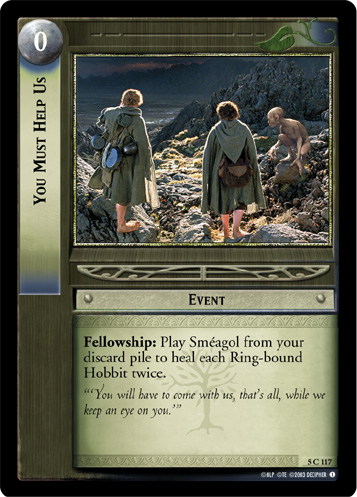 and Days Growing Dark (7U55)
and Days Growing Dark (7U55)
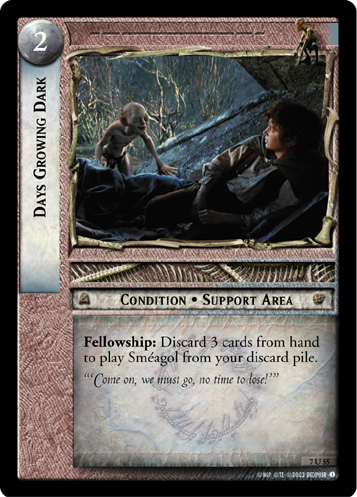 . However, these cards are relatively rarely played. Any card that pulls Sméagol from discard is a dead draw when he's in play, and any card that discards Sméagol is a dead draw when he's already in discard.
. However, these cards are relatively rarely played. Any card that pulls Sméagol from discard is a dead draw when he's in play, and any card that discards Sméagol is a dead draw when he's already in discard.
Sméagol is uncommon in pre-Shadows formats like Movie Block, but becomes more powerful after the Shadows set. The main reason is Dammed Gate-stream (11U235)
 . Dammed Gate-stream lets you download One Good Turn Deserves Another (11U49)
. Dammed Gate-stream lets you download One Good Turn Deserves Another (11U49)
 , a powerful, self-recurring site manipulation tool. The changes Shadows made to the site path makes site manipulation much more important. In Expanded, you can instead download Something Slimy (15U50)
, a powerful, self-recurring site manipulation tool. The changes Shadows made to the site path makes site manipulation much more important. In Expanded, you can instead download Something Slimy (15U50)
 to set up a key condition more quickly.
to set up a key condition more quickly.
Noteworthy Free Peoples cards[edit]
- Sméagol, Slinker (5R29)
 is a very durable defender who can lose skirmishes over and over for you, albeit at a high cost in burdens. He's only usable in decks with uncommonly good burden removal, but can even be an asset in decks that use The Shire Countryside (3R113)
is a very durable defender who can lose skirmishes over and over for you, albeit at a high cost in burdens. He's only usable in decks with uncommonly good burden removal, but can even be an asset in decks that use The Shire Countryside (3R113)
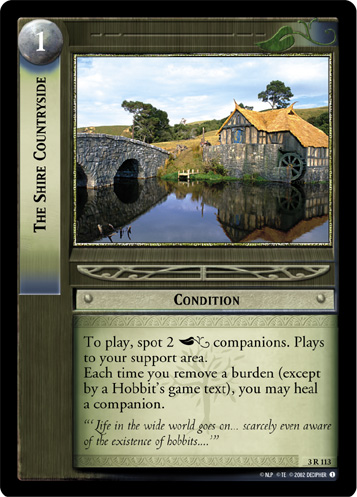 to turn burden removal into healing.
to turn burden removal into healing. - Sméagol, Poor Creature (6C45)
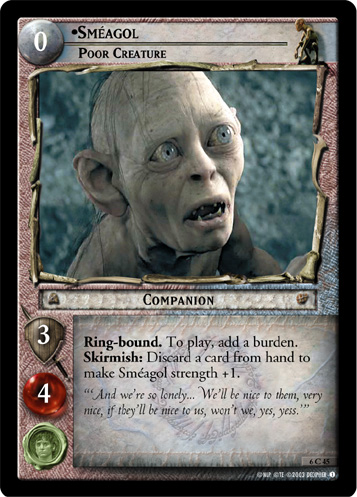 can be used to help cycle by discarding unwanted cards that are clogging up your hand. You can even use his ability if Smeagol isn't assigned to a skirmish, as long as someone is.
can be used to help cycle by discarding unwanted cards that are clogging up your hand. You can even use his ability if Smeagol isn't assigned to a skirmish, as long as someone is. - Sméagol, Always Helps (7R71)
 and Don’t Look at Them (6R39)
and Don’t Look at Them (6R39)
 are very powerful direct wounding tools. They're both strong on their own or in combination with other direct wounding, and as a combo they can kill any minion in the game at the cost of two threats and three cards in hand. Often used in Rainbow Wounding.
are very powerful direct wounding tools. They're both strong on their own or in combination with other direct wounding, and as a combo they can kill any minion in the game at the cost of two threats and three cards in hand. Often used in Rainbow Wounding. - Sméagol, Bearer of Great Secrets (9R+30)
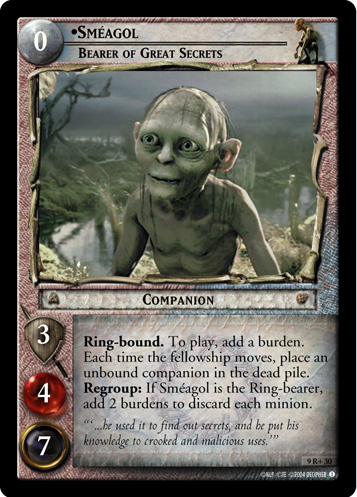 is an odd duck, generally only played in Solo Smeagol decks as the Ring-bearer. Sméagol isn't a strong skirmisher, but his Regroup ability makes double moves very safe. The challenge is figuring out how to run despite the fact that Sméagol kills a companion a turn, or figure out how to run while his only helpers are Bilbo, Sam, Frodo, Frenzied Fighter (13R149)
is an odd duck, generally only played in Solo Smeagol decks as the Ring-bearer. Sméagol isn't a strong skirmisher, but his Regroup ability makes double moves very safe. The challenge is figuring out how to run despite the fact that Sméagol kills a companion a turn, or figure out how to run while his only helpers are Bilbo, Sam, Frodo, Frenzied Fighter (13R149)
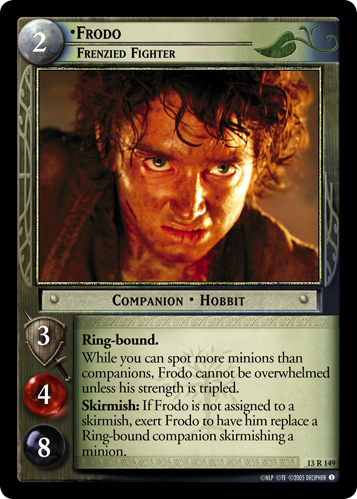 , and/or Ring-bound Rangers.
, and/or Ring-bound Rangers. - Sméagol, Simple Stoor (13U55)
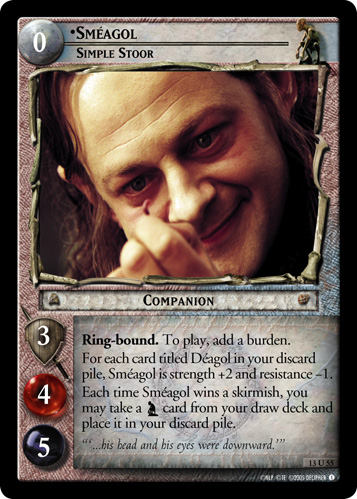 is another odd duck. He's chiefly useful in
is another odd duck. He's chiefly useful in Dwarven self-mill decks that run a huge deck and use cards like Ever My Heart Rises (4R46)
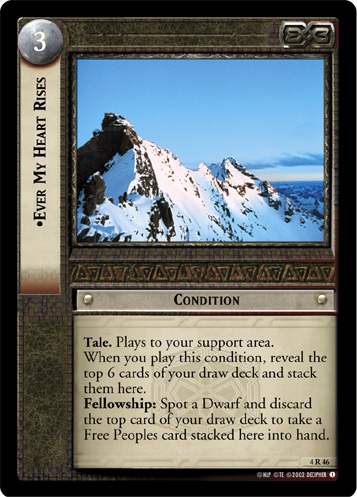 (helpfully downloaded using Dammed Gate-stream (11U235)
(helpfully downloaded using Dammed Gate-stream (11U235)
 and Something Slimy (15U50)
and Something Slimy (15U50)
 ) to mill most of your cards into the discard pile. If most of your deck is in the discard, then any recursion effects basically turn into tutors, plus any cards that spot cards in your discard are empowered. Simple Stoor isn't very strong without some way to mill a bunch of copies of Déagol into discard, but once you do, he's a passable skirmisher who helps thin unneeded
) to mill most of your cards into the discard pile. If most of your deck is in the discard, then any recursion effects basically turn into tutors, plus any cards that spot cards in your discard are empowered. Simple Stoor isn't very strong without some way to mill a bunch of copies of Déagol into discard, but once you do, he's a passable skirmisher who helps thin unneeded Gollum cards out of your deck, as well as empowering himself by milling out Softly Up Behind (13U56)
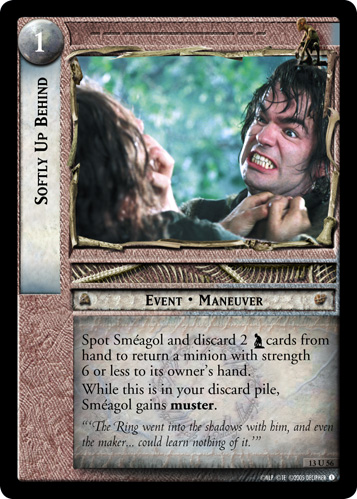 or any remaining copies of Déagol, Fateful Finder (13R46)
or any remaining copies of Déagol, Fateful Finder (13R46)
 . (There's a Shadow equivalent of Simple Stoor, Gollum, Her Sneak (13U50)
. (There's a Shadow equivalent of Simple Stoor, Gollum, Her Sneak (13U50)
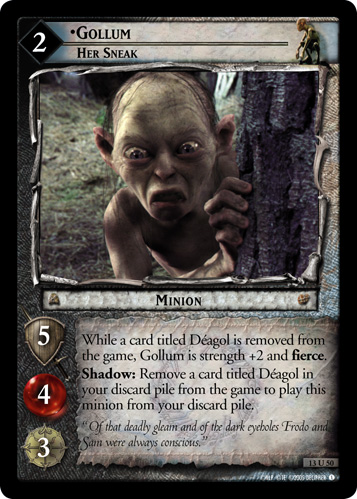 , but it isn't as good because its strength is capped.)
, but it isn't as good because its strength is capped.)
- Don’t Follow the Lights (6C38)
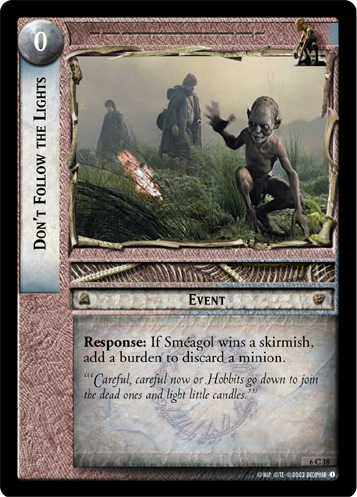 is only rarely worth it when played "fairly" by winning a skirmish with higher strength, but it can be a powerful supplement to a direct wounding strategy. As long as you kill whoever Sméagol is skirmishing after assignment but before the end of that skirmish, you can use this to pick off another minion at a very low cost. This is particularly great as a supplement for Sméagol, Always Helps (7R71)
is only rarely worth it when played "fairly" by winning a skirmish with higher strength, but it can be a powerful supplement to a direct wounding strategy. As long as you kill whoever Sméagol is skirmishing after assignment but before the end of that skirmish, you can use this to pick off another minion at a very low cost. This is particularly great as a supplement for Sméagol, Always Helps (7R71)
 /Don’t Look at Them (6R39)
/Don’t Look at Them (6R39)
 .
. - Follow Sméagol (5U23)
 and One Good Turn Deserves Another (11U49)
and One Good Turn Deserves Another (11U49)
 are staples in post-Shadows formats. site manipulation is a powerful offensive and defensive tool in those formats, and Sméagol is relatively easy to add to your deck to control the site path. (Still Far Ahead (8U29)
are staples in post-Shadows formats. site manipulation is a powerful offensive and defensive tool in those formats, and Sméagol is relatively easy to add to your deck to control the site path. (Still Far Ahead (8U29)
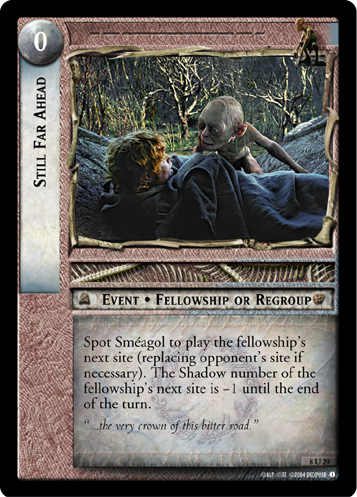 is a cheaper, one-time alternative along these lines, occasionally played in unofficial formats where those two are banned.)
is a cheaper, one-time alternative along these lines, occasionally played in unofficial formats where those two are banned.) - Clever Hobbits (7U54)
 is a card with two functions. The first, and most obvious, is a middling-quality pump for Sméagol himself. It's nice that it's uncapped, but it comes at a high price when you're discarding your own conditions. However, it can also discard your opponent's
is a card with two functions. The first, and most obvious, is a middling-quality pump for Sméagol himself. It's nice that it's uncapped, but it comes at a high price when you're discarding your own conditions. However, it can also discard your opponent's conditions, even if you don't have Sméagol in play. It's even occasionally played in decks that don't use him at all, as tech against Ninja Gollum Shadow decks.
- Nasty (7U64)
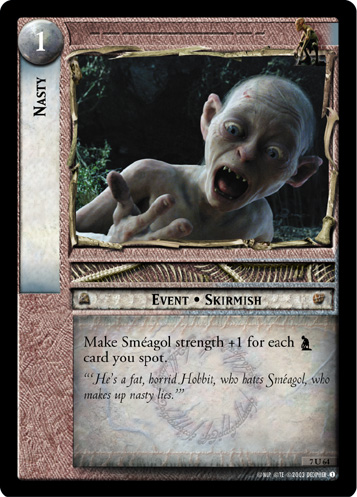 can be a very strong pump in the late game or against a
can be a very strong pump in the late game or against a Gollum-focused Shadow. It's generally the strongest pre-Shadows pump for Sméagol, although it can be of limited value early in the game or in a deck that only splashes Sméagol for a couple of cards.
No Safe Places (7R66)
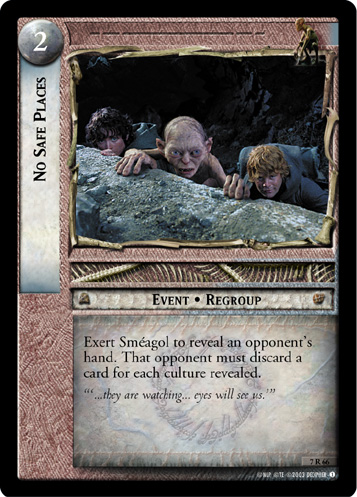 counts both Free Peoples and Shadow cultures, so it will usually discard at least two cards, and often three or four. It's an interesting supplement to a
counts both Free Peoples and Shadow cultures, so it will usually discard at least two cards, and often three or four. It's an interesting supplement to a Elven or
Sauron discard deck, or possibly to a
Dwarven mill deck.
Secret Paths (7R69)
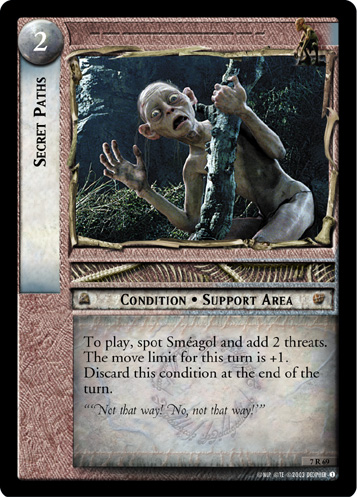 is a strong Move Limit card, similar to Final Throw
is a strong Move Limit card, similar to Final Throw
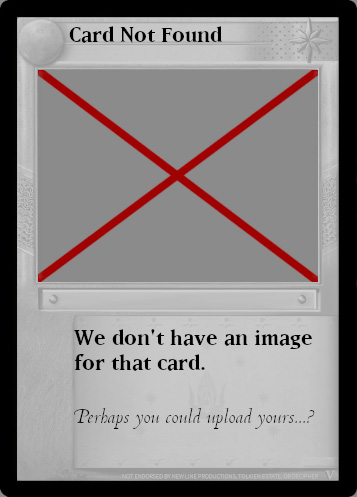 . It's only useful in decks that are running Sméagol already or formats that don't include Reflections, because if you want to splash a single out-of-culture minion to get +1 move limit, you can play Radagast, The Brown (9R+26)
. It's only useful in decks that are running Sméagol already or formats that don't include Reflections, because if you want to splash a single out-of-culture minion to get +1 move limit, you can play Radagast, The Brown (9R+26)
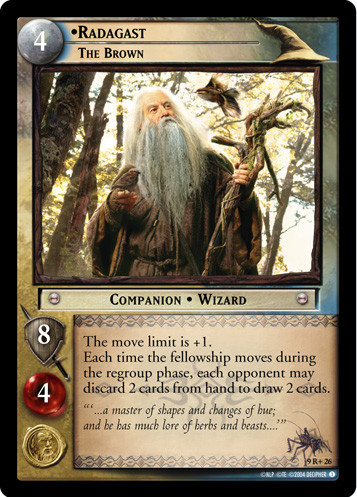 .
.
Déagol, Fateful Finder (13R46)
 is a powerful tool to download artifacts or possessions onto your characters, and it can in turn be downloaded by Erkenbrand's Horn (18R96)
is a powerful tool to download artifacts or possessions onto your characters, and it can in turn be downloaded by Erkenbrand's Horn (18R96)
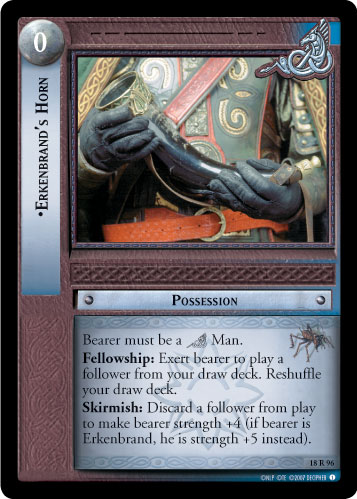 . This is a common combo in Horn Filter, helping to set up your other characters more quickly. The chief weakness of this strategy is that having so many different cultures in your deck will make you vulnerable to Rainbow hate like Gríma, Chief Counselor (5R51)
. This is a common combo in Horn Filter, helping to set up your other characters more quickly. The chief weakness of this strategy is that having so many different cultures in your deck will make you vulnerable to Rainbow hate like Gríma, Chief Counselor (5R51)
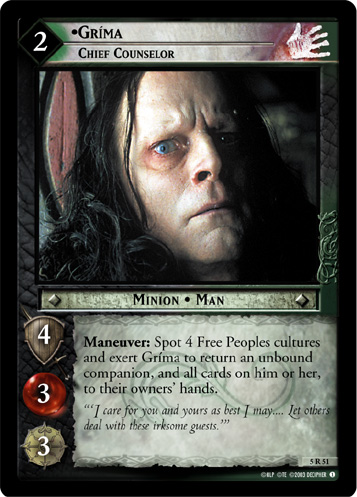 , although this can be alleviated somewhat by discarding Déagol using his game text and killing off Sméagol.
, although this can be alleviated somewhat by discarding Déagol using his game text and killing off Sméagol.
Gladden Homestead (13R49)
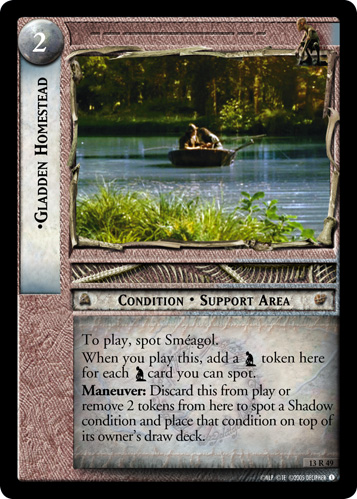 knocks your opponent's conditions out of play for a turn, removes all of the cards or tokens stacked on them, clogs up your opponent's hand, and puts those cards where they can be discarded with mill. It's especially effective against Shadow
knocks your opponent's conditions out of play for a turn, removes all of the cards or tokens stacked on them, clogs up your opponent's hand, and puts those cards where they can be discarded with mill. It's especially effective against Shadow Gollum decks, because it spots their
conditions and bypasses Deceit (18R29)
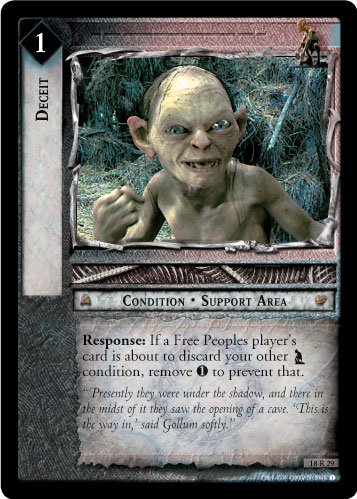 . Along with Nice Fish (15C46)
. Along with Nice Fish (15C46)
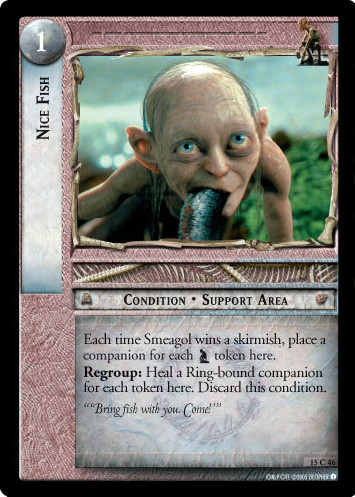 , it's one of only two cards that stack
, it's one of only two cards that stack tokens on themselves.
Naked Waste (13U53)
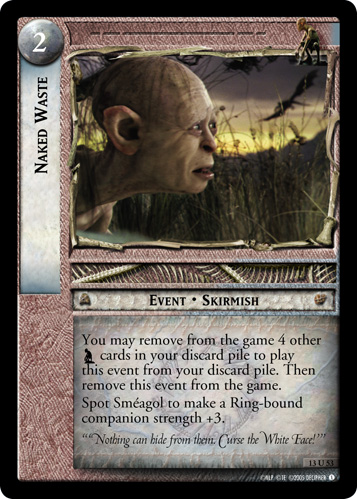 is part of a cycle of similar pump events, but notable in that it can remove both Free Peoples and Shadow
is part of a cycle of similar pump events, but notable in that it can remove both Free Peoples and Shadow Gollum culture cards to pay for recurring it. There's a similar Shadow card that works the same way, Cunningly Hidden (13U45)
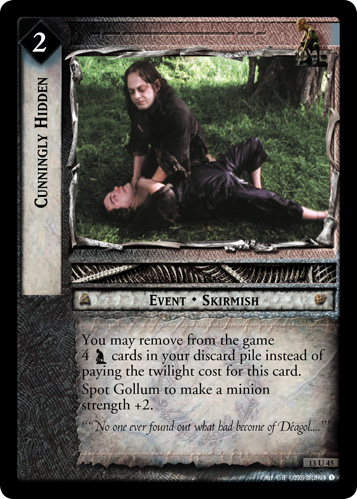 .
.
Nice Fish (15C46)
 can be a lot of healing if you can get Sméagol's strength up. It's mainly useful in Solo Smeagol.
can be a lot of healing if you can get Sméagol's strength up. It's mainly useful in Solo Smeagol.
Something Slimy (15U50)
 can tutor one condition of any culture, and can downloaded with Dammed Gate-stream (11U235)
can tutor one condition of any culture, and can downloaded with Dammed Gate-stream (11U235)
 . It's great for setting up any deck that relies heavily on one particular condition, as with Stewards’ Legacy (13U75)
. It's great for setting up any deck that relies heavily on one particular condition, as with Stewards’ Legacy (13U75)
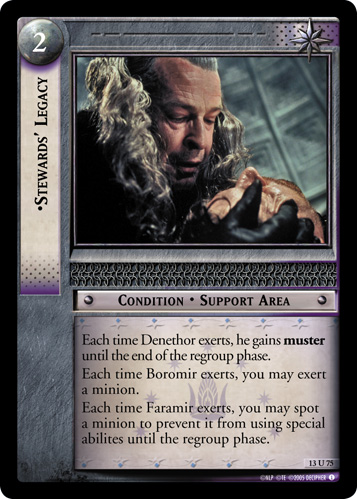 or
or Dwarven self-mill decks using Ever My Heart Rises (4R46)
 , or for any deck with many powerful conditions. Note that this cannot be used on Shadow cards, as it requires playing the card in the Fellowship Phase.
, or for any deck with many powerful conditions. Note that this cannot be used on Shadow cards, as it requires playing the card in the Fellowship Phase.
Shadow[edit]
site manip: Led Astray (11U45)

tutoring, recursion: Incited (11R44)

Standout Cards[edit]
Gollum[edit]
- Gollum, Stinker (5R25)
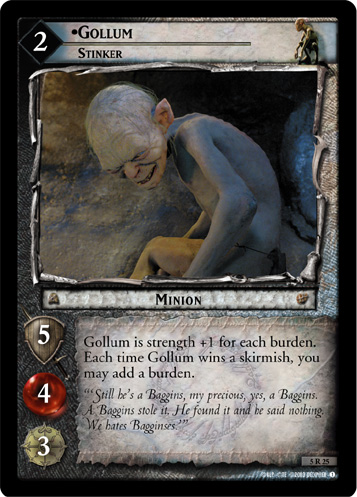 is one of the highest-strength versions of Gollum, and fits well into any deck that places burdens, like Corruption decks or Beasterlings. Most versions of Gollum aren't going to win many skirmishes, but this is one of the exceptions.
is one of the highest-strength versions of Gollum, and fits well into any deck that places burdens, like Corruption decks or Beasterlings. Most versions of Gollum aren't going to win many skirmishes, but this is one of the exceptions. - Gollum, Old Villain (6C40)
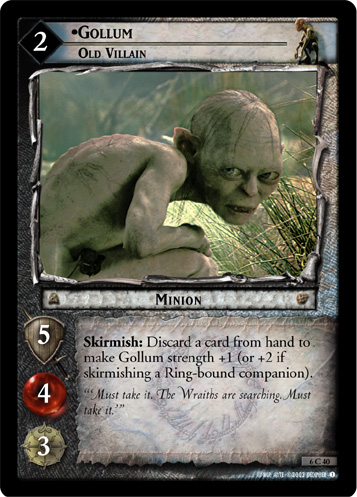 is a very consistent card, even if its power ceiling isn't all that high. It poses a dilemma for the Free Peoples player: even if you don't have any other pumps for Gollum, his strength could be as much 5 plus your current hand size. It probably won't be, but who wants to take that chance? Even if you're not concerned with winning a skirmish with Gollum at the moment, Old Villain can cycle unwanted cards to clear up a clogged hand, making your whole deck more consistent.
is a very consistent card, even if its power ceiling isn't all that high. It poses a dilemma for the Free Peoples player: even if you don't have any other pumps for Gollum, his strength could be as much 5 plus your current hand size. It probably won't be, but who wants to take that chance? Even if you're not concerned with winning a skirmish with Gollum at the moment, Old Villain can cycle unwanted cards to clear up a clogged hand, making your whole deck more consistent. - Gollum, Plotting Deceiver (7R58)
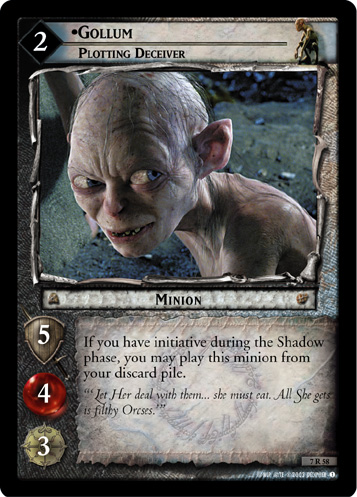 is not a strong minion. However, in decks with Shadow cards that seize Initiative like Corsair War Galley (8U59)
is not a strong minion. However, in decks with Shadow cards that seize Initiative like Corsair War Galley (8U59)
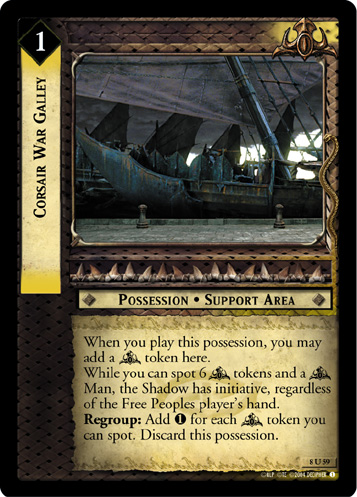 , it means you can play Gollum over and over without any other support. He can just be another minion as part of a swarm, a consistent source of threats from Fat One Wants It (7R57)
, it means you can play Gollum over and over without any other support. He can just be another minion as part of a swarm, a consistent source of threats from Fat One Wants It (7R57)
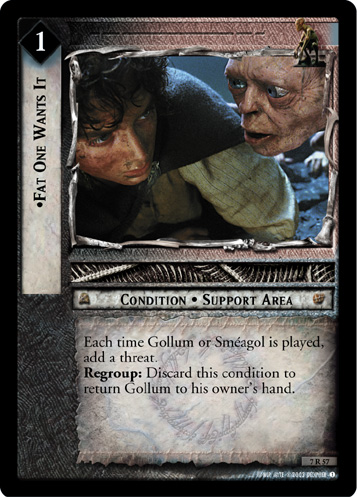 , or you can just be sure Gollum is in play for cards that spot or exert him.
, or you can just be sure Gollum is in play for cards that spot or exert him. - Gollum, Vile Creature (7C59)
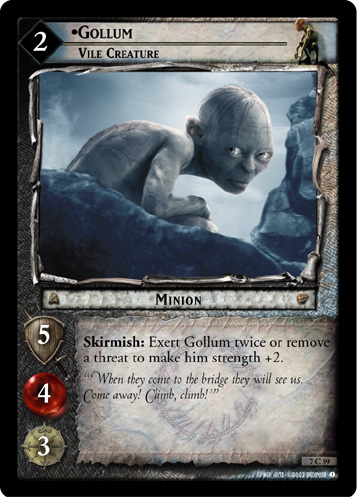 eats threats to win skirmishes. Captured by the Ring (7C53)
eats threats to win skirmishes. Captured by the Ring (7C53)
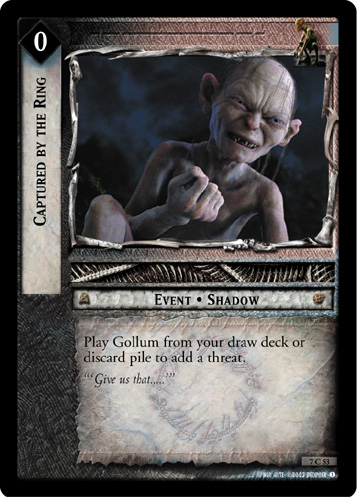 and Fat One Wants It (7R57)
and Fat One Wants It (7R57)
 can generate the threats, and with a decent pool of threats, this is one of the few Gollums that can be counted on to win skirmishes.
can generate the threats, and with a decent pool of threats, this is one of the few Gollums that can be counted on to win skirmishes. - Gollum, Dark as Darkness (9R+28)
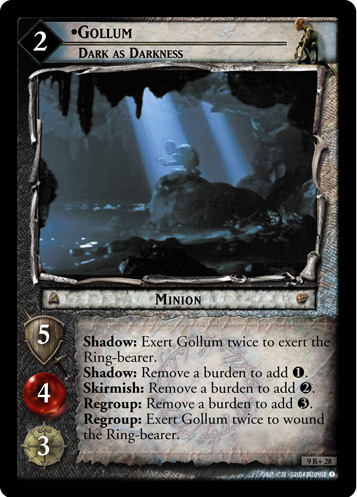 is a utility knife. You'll never feel bad playing Dark as Darkness, since he can come down and exert the Ring-bearer right away. If he survives his skirmish, he can instead wound the Ring-bearer in the Regroup phase. If they don't have one of the versions of The One Ring that allows them to put it on as a Response: ability, that can steal wins right out from under your opponent's nose.
is a utility knife. You'll never feel bad playing Dark as Darkness, since he can come down and exert the Ring-bearer right away. If he survives his skirmish, he can instead wound the Ring-bearer in the Regroup phase. If they don't have one of the versions of The One Ring that allows them to put it on as a Response: ability, that can steal wins right out from under your opponent's nose. - Gollum, Mad Thing (10R21)
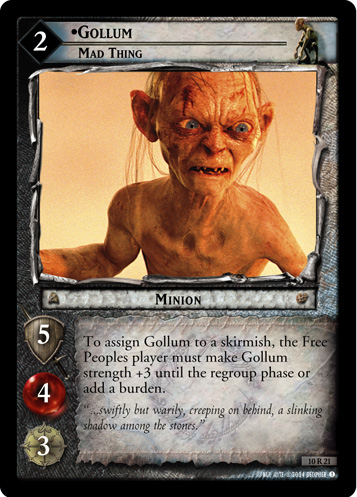 is occasionally useful, but mostly relies on your opponent to make a misplay. Your opponent gets to choose: allow Gollum to skirmish whoever he wants at strength 5 (which is almost always a bad choice), Gollum skirmishes as a normal strength 8 minion, or your opponent places a burden. This is okay in the early game if you have some way to take advantage of your opponent just eating the burden, but a strength 8 minion is rarely a big deal. He does have some nice synergy with Hidden Even From Her (8C22)
is occasionally useful, but mostly relies on your opponent to make a misplay. Your opponent gets to choose: allow Gollum to skirmish whoever he wants at strength 5 (which is almost always a bad choice), Gollum skirmishes as a normal strength 8 minion, or your opponent places a burden. This is okay in the early game if you have some way to take advantage of your opponent just eating the burden, but a strength 8 minion is rarely a big deal. He does have some nice synergy with Hidden Even From Her (8C22)
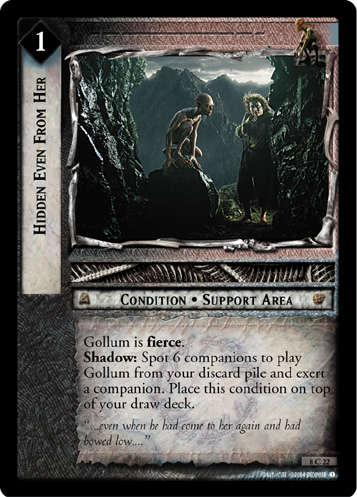 , since giving him Fierce means he gets the strength bonus twice for the fierce skirmish. On the other hand, he has anti-synergy with Reclaim the Precious (10U22)
, since giving him Fierce means he gets the strength bonus twice for the fierce skirmish. On the other hand, he has anti-synergy with Reclaim the Precious (10U22)
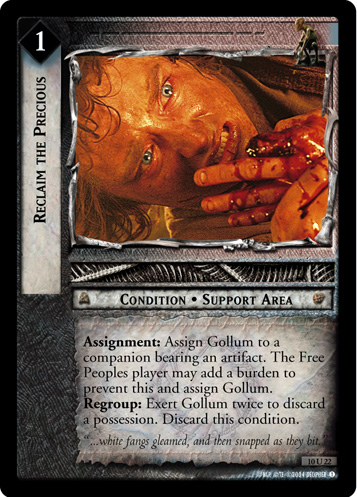 , since he only gets his strength bonus if the Free Peoples player is assigning him to a skirmish.
, since he only gets his strength bonus if the Free Peoples player is assigning him to a skirmish. - Gollum, Skulker (11R42)
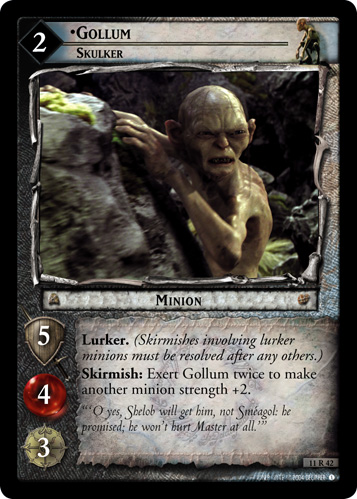 is a general-purpose Gollum that pumps another minion. The effect isn't particularly strong, and this Gollum will almost always lose his own skirmish, but Lurker means he can cheaply buff another minion then get recycled with one of the many
is a general-purpose Gollum that pumps another minion. The effect isn't particularly strong, and this Gollum will almost always lose his own skirmish, but Lurker means he can cheaply buff another minion then get recycled with one of the many Gollum recursion cards.
- Gollum, Hopeless (15R43)
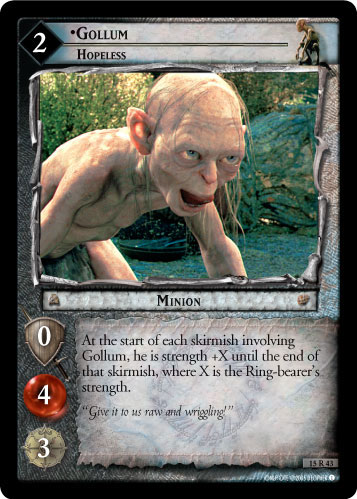 is occasionally useful against alternate Ring-bearers with higher base strength, decks that stack strength-boosters on the Ring-bearer, and The One Ring, Such a Weight to Carry (7R2)
is occasionally useful against alternate Ring-bearers with higher base strength, decks that stack strength-boosters on the Ring-bearer, and The One Ring, Such a Weight to Carry (7R2)
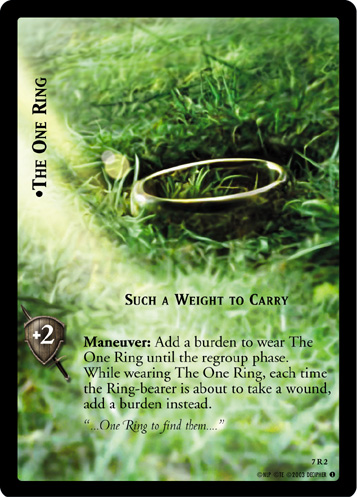 , but it's not very reliable. It's mainly played as a one-of, because it's so easy to search your deck or discard for a Gollum of your choice.
, but it's not very reliable. It's mainly played as a one-of, because it's so easy to search your deck or discard for a Gollum of your choice. - Gollum, Threatening Guide (19P10)
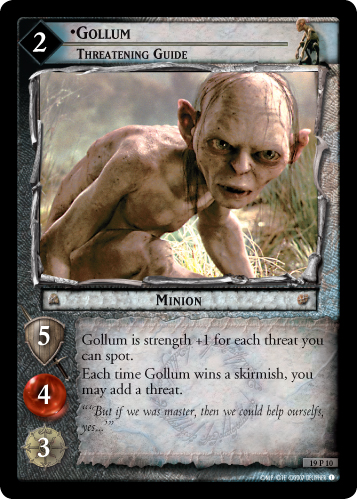 is a high-strength Gollum suited to decks that generate threats. This is one of the strongest skirmishing Gollums in the game, especially since Free Peoples decks in Expanded often generate lots of threats with large Fellowships.
is a high-strength Gollum suited to decks that generate threats. This is one of the strongest skirmishing Gollums in the game, especially since Free Peoples decks in Expanded often generate lots of threats with large Fellowships.
Shelob[edit]
- Shelob, Eater of Light (8R25)
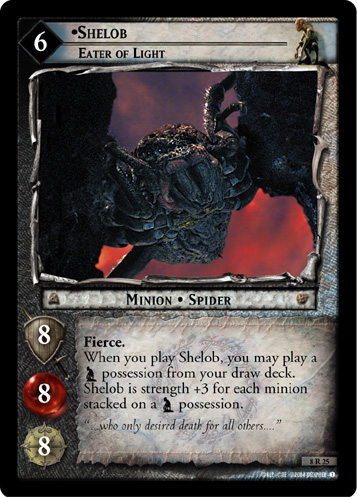 isn't the strongest version of Shelob, but she can download Web (8C30)
isn't the strongest version of Shelob, but she can download Web (8C30)
 for later use. (She can also download Larder (8U23)
for later use. (She can also download Larder (8U23)
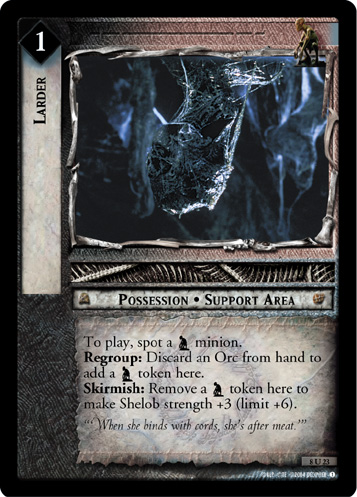 and Spider Poison (8C28)
and Spider Poison (8C28)
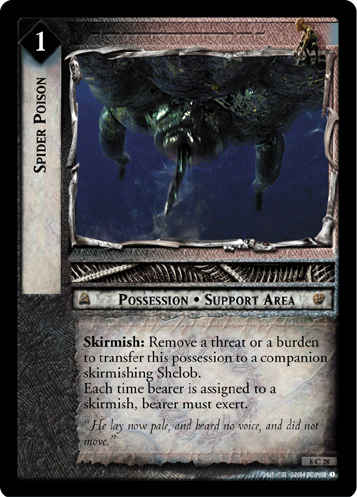 , both of which are rarely played.)
, both of which are rarely played.) - Shelob, Her Ladyship (10R23)
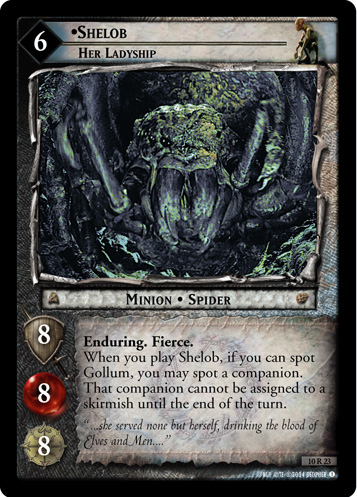 is the strongest version of Shelob. She shuts down your opponent's strongest skirmisher, hard counters archery, and, like all Enduring minions, gets a strength boost from any random cards that exert her or wound her to generate a benefit. (She's best buds with Gothmog, Morgul Leader (18R80)
is the strongest version of Shelob. She shuts down your opponent's strongest skirmisher, hard counters archery, and, like all Enduring minions, gets a strength boost from any random cards that exert her or wound her to generate a benefit. (She's best buds with Gothmog, Morgul Leader (18R80)
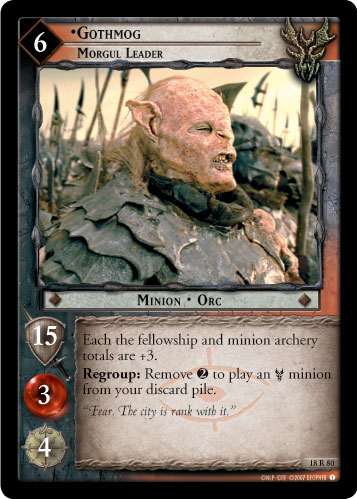 , and she loves to vacation in Pelennor Prairie (10U118)
, and she loves to vacation in Pelennor Prairie (10U118)
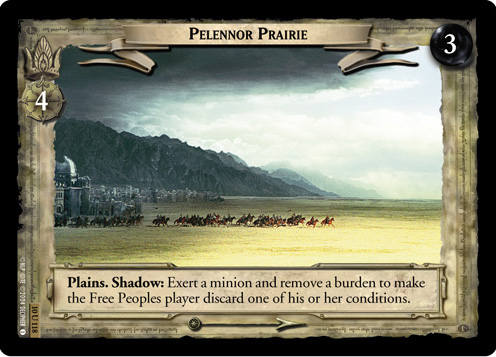 , Osgiliath Crossing (7U353)
, Osgiliath Crossing (7U353)
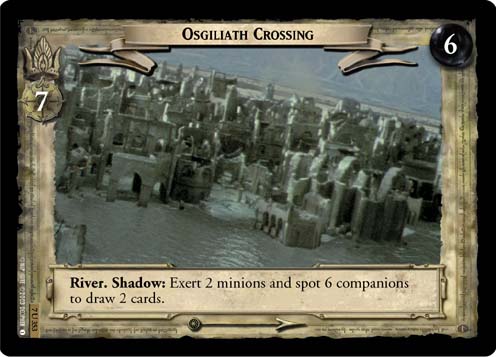 , or Dol Guldur (17U145)
, or Dol Guldur (17U145)
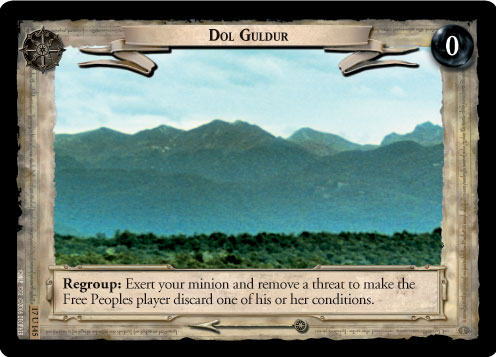 .) Along with Gollum himself, she's the star of Ninja Gollum.
.) Along with Gollum himself, she's the star of Ninja Gollum.
Recursion and Tutoring[edit]
- We Must Have It (5C30)
 and Captured by the Ring (7C53)
and Captured by the Ring (7C53)
 download or recur Gollum, as needed, and can be thought of as extra copies of Gollum in your deck. Plus, because they let you pick which version of Gollum you want to use, you can include multiple different versions for different situations. So Polite (7R74)
download or recur Gollum, as needed, and can be thought of as extra copies of Gollum in your deck. Plus, because they let you pick which version of Gollum you want to use, you can include multiple different versions for different situations. So Polite (7R74)
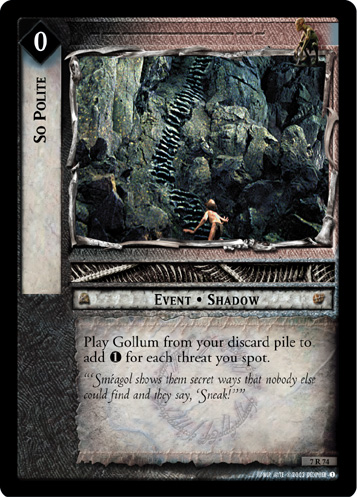 is similar but rarely played, since it clogs up your hand if Gollum isn't in your discard pile, and only works in threat decks, which are generally already playing Captured By The Ring and Fat One Wants It (7R57)
is similar but rarely played, since it clogs up your hand if Gollum isn't in your discard pile, and only works in threat decks, which are generally already playing Captured By The Ring and Fat One Wants It (7R57)
 .
. - Evil-smelling Fens (5U22)
 can recur any minion of any culture. It's strong in any deck that plans to play Gollum over and over, but especially strong in decks that mill themselves. However, it does not work well with Gollum, Dark as Darkness (9R+28)
can recur any minion of any culture. It's strong in any deck that plans to play Gollum over and over, but especially strong in decks that mill themselves. However, it does not work well with Gollum, Dark as Darkness (9R+28)
 , who wants to exert himself for a different effect. With a large discard pile, this lets you tutor out any magic bullet minion against your opponents' deck, making narrowly situational hate cards much more useful. This also makes every site into a Marsh with no cultural enforcement, so it's a key card in making the Moria Tentacles deck work, even if that deck isn't running Gollum himself.
, who wants to exert himself for a different effect. With a large discard pile, this lets you tutor out any magic bullet minion against your opponents' deck, making narrowly situational hate cards much more useful. This also makes every site into a Marsh with no cultural enforcement, so it's a key card in making the Moria Tentacles deck work, even if that deck isn't running Gollum himself. - Let Her Deal With Them (7R63)
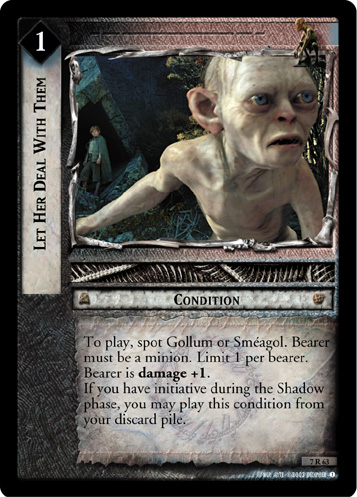 is a self-recurring way to buff minions, especially fierce minions like Shelob, Her Ladyship (10R23)
is a self-recurring way to buff minions, especially fierce minions like Shelob, Her Ladyship (10R23)
 . It's popular in Ninja Gollum, as Damage +1 is in turn basically doubled by Promise Keeping (8R24)
. It's popular in Ninja Gollum, as Damage +1 is in turn basically doubled by Promise Keeping (8R24)
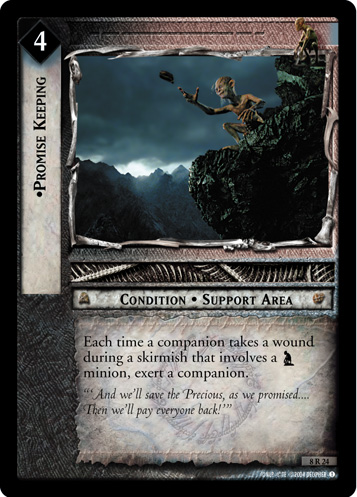 when it kills someone, but it also works well in
when it kills someone, but it also works well in Sauron or
Raider decks that seize Initiative. It also works well with Gollum, Plotting Deceiver (7R58)
 , although you'll probably want to play the condition itself on a stronger minion.
, although you'll probably want to play the condition itself on a stronger minion. - Web (8C30)
 is one of the few tools that can recur Shelob (although Gollum can come along too, of course), and can be downloaded by Shelob, Eater of Light (8R25)
is one of the few tools that can recur Shelob (although Gollum can come along too, of course), and can be downloaded by Shelob, Eater of Light (8R25)
 . The only reason to stack orcs on it is to buff Shelob, Eater of Light (8R25)
. The only reason to stack orcs on it is to buff Shelob, Eater of Light (8R25)
 or occasionally prevent triggers that happen when a minion is discarded, as with Mordor Guard (7C287)
or occasionally prevent triggers that happen when a minion is discarded, as with Mordor Guard (7C287)
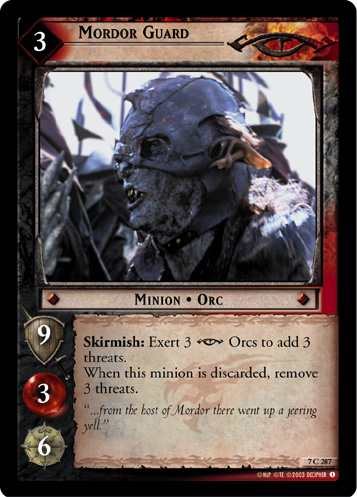 . (
. (Isengard orcs like Isengard Tender (6U70)
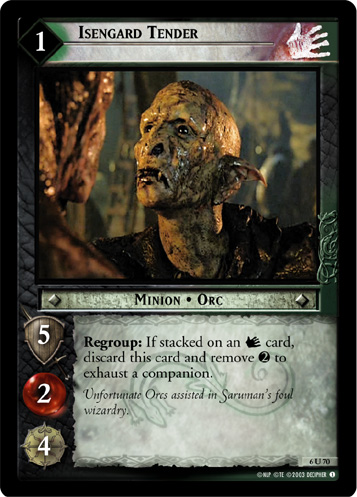 don't have any particular synergy with Web.)
don't have any particular synergy with Web.) - Sudden Strike (15U51)
 is expensive, but very powerful, especially with a deck full of Magic Bullet minions to counter specific Free Peoples strategies. The latter half of the card is only occasionally useful.
is expensive, but very powerful, especially with a deck full of Magic Bullet minions to counter specific Free Peoples strategies. The latter half of the card is only occasionally useful.
Direct Wounding[edit]
- They Stole It (6R46)
 and You’re a Liar and a Thief (6C47)
and You’re a Liar and a Thief (6C47)
 are the original
are the original Gollum direct wounding cards, and key parts of Ninja Gollum. Later, this strategy adds more direct wounding cards, like Horribly Strong (11R43)
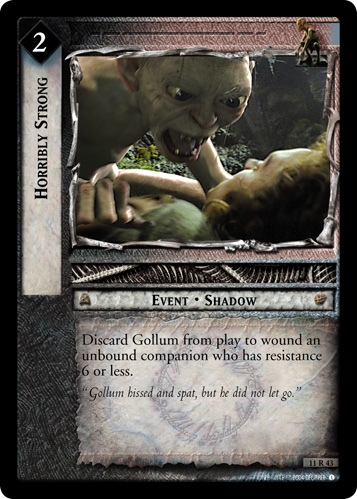 and Not This Time! (15R47)
and Not This Time! (15R47)
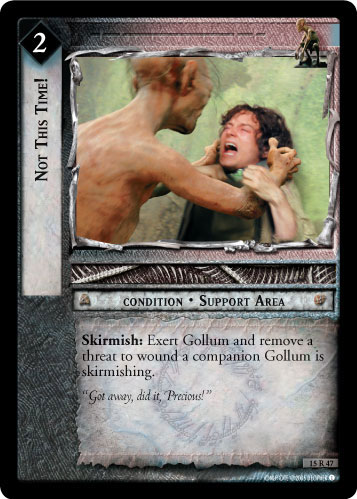 . (There's also Frenzied Attack (11U41)
. (There's also Frenzied Attack (11U41)
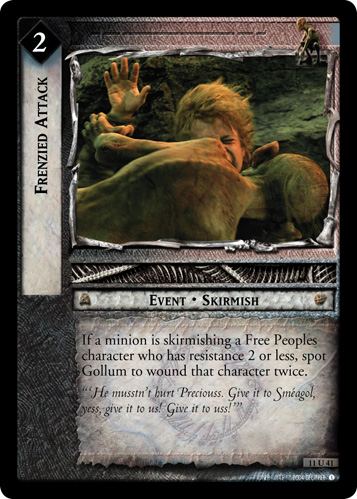 , but it's so situational that it's rarely played.) Just getting into a skirmish with Gollum is dangerous for the Free Peoples player when you're playing these cards, since Gollum can leave a mark, or even kill the companion he is fighting before the skirmish completes. Combining these with a large stack of threats and Promise Keeping (8R24)
, but it's so situational that it's rarely played.) Just getting into a skirmish with Gollum is dangerous for the Free Peoples player when you're playing these cards, since Gollum can leave a mark, or even kill the companion he is fighting before the skirmish completes. Combining these with a large stack of threats and Promise Keeping (8R24)
 can even mean that Gollum kills one companion and wipes out the entire Fellowship. This is a key part of the Ninja Gollum strategy.
can even mean that Gollum kills one companion and wipes out the entire Fellowship. This is a key part of the Ninja Gollum strategy. - Promise Keeping (8R24)
 is an incredibly strong card, and a key part of the Ninja Gollum strategy. It basically doubles all of the wounds caused during one of Gollum's skirmishes. That's fairly strong on base rate. However, it also duplicates wounds caused by other cards that wound during the Skirmish Phase as long as they do it during Gollum's skirmish. If They Stole It (6R46)
is an incredibly strong card, and a key part of the Ninja Gollum strategy. It basically doubles all of the wounds caused during one of Gollum's skirmishes. That's fairly strong on base rate. However, it also duplicates wounds caused by other cards that wound during the Skirmish Phase as long as they do it during Gollum's skirmish. If They Stole It (6R46)
 wounds a companion, a companion gets exerted. If a companion is killed by wounds during Gollum's skirmish, all of the wounds caused by threats get duplicated too! Promise Keeping applies an exertion after each threat, so it often helps a large threat stack to cause kills. Ninja Gollum decks, if they set up perfectly, often see Gollum strangling one companion to death, and the whole rest of the Fellowship falling over dead.
wounds a companion, a companion gets exerted. If a companion is killed by wounds during Gollum's skirmish, all of the wounds caused by threats get duplicated too! Promise Keeping applies an exertion after each threat, so it often helps a large threat stack to cause kills. Ninja Gollum decks, if they set up perfectly, often see Gollum strangling one companion to death, and the whole rest of the Fellowship falling over dead. - Horribly Strong (11R43)
 is a direct wounding card that usually works against most characters, especially if your deck stacks a few burdens, and fairly common in Ninja Gollum. Frenzied Attack (11U41)
is a direct wounding card that usually works against most characters, especially if your deck stacks a few burdens, and fairly common in Ninja Gollum. Frenzied Attack (11U41)
 is a similar card, but rarely played because it will clog your hand until you stack four or five burdens.
is a similar card, but rarely played because it will clog your hand until you stack four or five burdens. - Little Snuffler (13U52)
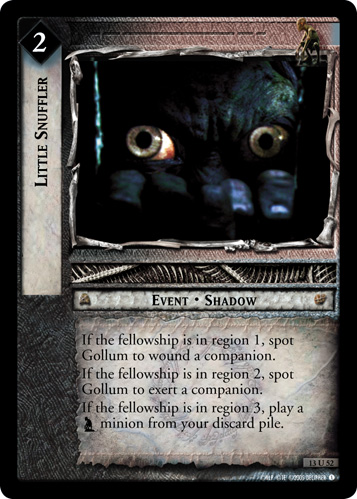 is a direct wounding card that can kill the Ring-bearer stone dead in the early game. If you draw enough copies. And assuming you draw Gollum (admittedly, a safe assumption). And they don't have any cards that prevent wounds or add vitality. And they don't have one of the versions of The One Ring that allows them to put it on as a Response: ability. Little Snuffler decks are a hilarious but unreliable gimmick variant of Ninja Gollum.
is a direct wounding card that can kill the Ring-bearer stone dead in the early game. If you draw enough copies. And assuming you draw Gollum (admittedly, a safe assumption). And they don't have any cards that prevent wounds or add vitality. And they don't have one of the versions of The One Ring that allows them to put it on as a Response: ability. Little Snuffler decks are a hilarious but unreliable gimmick variant of Ninja Gollum. - Not This Time! (15R47)
 is another source of direct wounding for Ninja Gollum decks.
is another source of direct wounding for Ninja Gollum decks. - Unseen Foe (15R53)
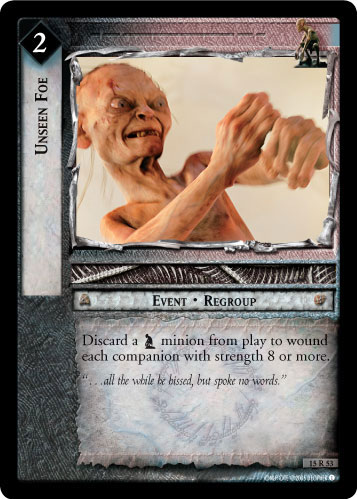 is usually good for two or three direct wounds, and can be a bit of a blowout against
is usually good for two or three direct wounds, and can be a bit of a blowout against Dwarven possession decks and Ents. Regroup Phase wounding is very difficult to defend against -- only versions of The One Ring that allows them to put it on as a Response: ability can defend the Ring-bearer against it -- but this will often miss the Ring-bearer anyway. It doesn't work with Promise Keeping (8R24)
 , though.
, though.
Threats[edit]
- Fat One Wants It (7R57)
 generates a threat every time you play Gollum, either enabling cards like Gollum, Vile Creature (7C59)
generates a threat every time you play Gollum, either enabling cards like Gollum, Vile Creature (7C59)
 or simply causing damage whenever a companion dies. A copy or two of Gollum, plus Fat One Wants It and Captured by the Ring (7C53)
or simply causing damage whenever a companion dies. A copy or two of Gollum, plus Fat One Wants It and Captured by the Ring (7C53)
 are a solid splash into any deck focusing on threats. The recursion effect is occasionally useful, but if that's all you want, the events are cheaper.
are a solid splash into any deck focusing on threats. The recursion effect is occasionally useful, but if that's all you want, the events are cheaper. - Plotting (7R67)
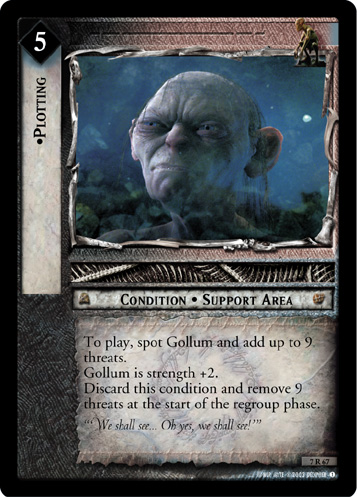 is a very expensive combo tool, used to enable some very strong threat-based combo. (Simply consuming the threats with Gollum, Vile Creature (7C59)
is a very expensive combo tool, used to enable some very strong threat-based combo. (Simply consuming the threats with Gollum, Vile Creature (7C59)
 or buffing Gollum, Threatening Guide (19P10)
or buffing Gollum, Threatening Guide (19P10)
 generally won't cut it, at this cost.) It can be useful to set up a Promise Keeping (8R24)
generally won't cut it, at this cost.) It can be useful to set up a Promise Keeping (8R24)
 kill, or a Northern Ithilien (7U359)
kill, or a Northern Ithilien (7U359)
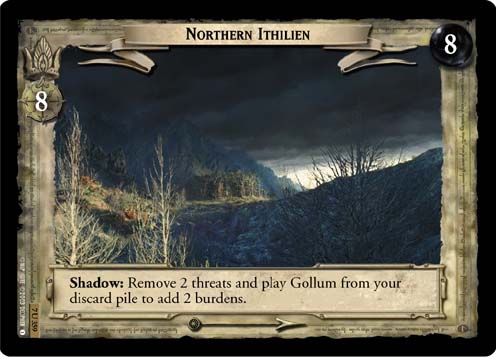 /Watcher in the Water, Keeper of Westgate (2R73)
/Watcher in the Water, Keeper of Westgate (2R73)
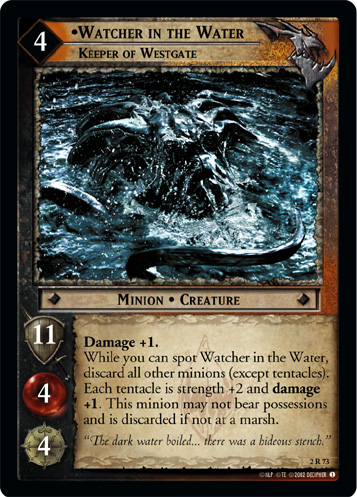 corruption bomb.
corruption bomb.
Other Noteworthy Cards[edit]
- Hobbitses Are Dead (7R61)
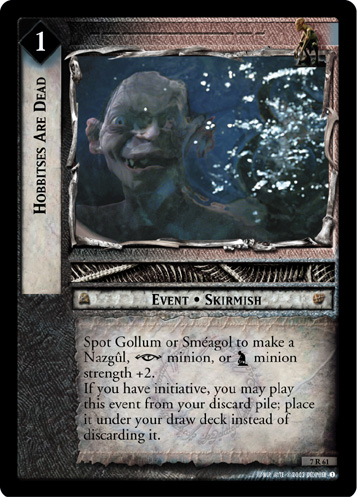 is not a strong pump, although it is a versatile one! Not only does it work on two other cultures, but it also benefits from cards that guarantee Shadow has Initiative, played in
is not a strong pump, although it is a versatile one! Not only does it work on two other cultures, but it also benefits from cards that guarantee Shadow has Initiative, played in Sauron or
Raider decks.
- Hidden Even From Her (8C22)
 helps versions of Gollum that are strong skirmishers, like Gollum, Stinker (5R25)
helps versions of Gollum that are strong skirmishers, like Gollum, Stinker (5R25)
 , Gollum, Vile Creature (7C59)
, Gollum, Vile Creature (7C59)
 , and Gollum, Threatening Guide (19P10)
, and Gollum, Threatening Guide (19P10)
 . It doubles as an unreliable backup tool to recur Gollum. Note that it has anti-synergy with versions of Gollum that don't skirmish well and just want to survive to the Regroup phase, like Gollum, Dark as Darkness (9R+28)
. It doubles as an unreliable backup tool to recur Gollum. Note that it has anti-synergy with versions of Gollum that don't skirmish well and just want to survive to the Regroup phase, like Gollum, Dark as Darkness (9R+28)
 and Gollum, Nasty Treacherous Creature (5C24)
and Gollum, Nasty Treacherous Creature (5C24)
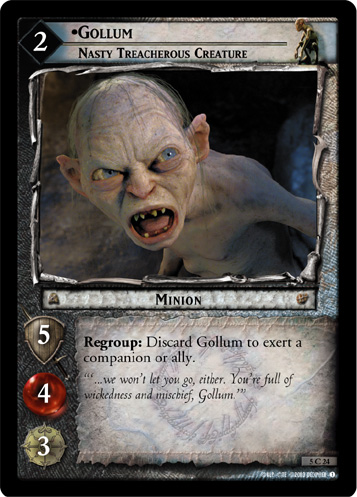 .
. - Slippery as Fishes (9R+29)
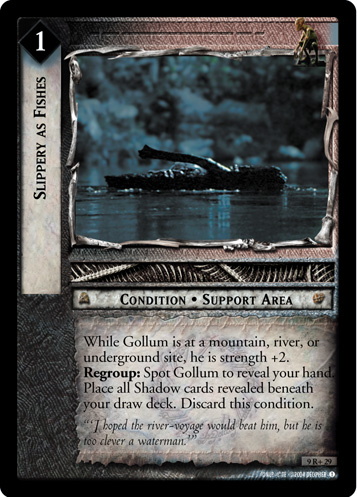 is a meta-dependent, format-dependent strength boost for Gollum. It will depend largely on what sites you want to fit into your deck, and what sites you think your opponents are likely to play. It's also occasionally useful for setting up a Shadow combo late in the game, although most Free Peoples opponents will take it as a sign that it's safe to double move.
is a meta-dependent, format-dependent strength boost for Gollum. It will depend largely on what sites you want to fit into your deck, and what sites you think your opponents are likely to play. It's also occasionally useful for setting up a Shadow combo late in the game, although most Free Peoples opponents will take it as a sign that it's safe to double move. - A Dark Shape Sprang (10R19)
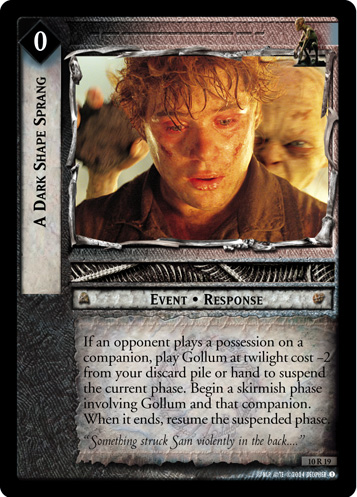 lets you ambush a companion out of phase, which is a unique and very powerful effect and the only way to kill the Ring-bearer at site 1. However, most possessions make that companion better able to handle a low-strength skirmisher like Gollum. If you're lucky, this can combo well with cards like They Stole It (6R46)
lets you ambush a companion out of phase, which is a unique and very powerful effect and the only way to kill the Ring-bearer at site 1. However, most possessions make that companion better able to handle a low-strength skirmisher like Gollum. If you're lucky, this can combo well with cards like They Stole It (6R46)
 , but you're relying on your opponent to play a possession on a key target when you have all of the key pieces in the right place. This is an obnoxious and occasionally-powerful card, but not a reliable one.
, but you're relying on your opponent to play a possession on a key target when you have all of the key pieces in the right place. This is an obnoxious and occasionally-powerful card, but not a reliable one. - Final Strike (10U20)
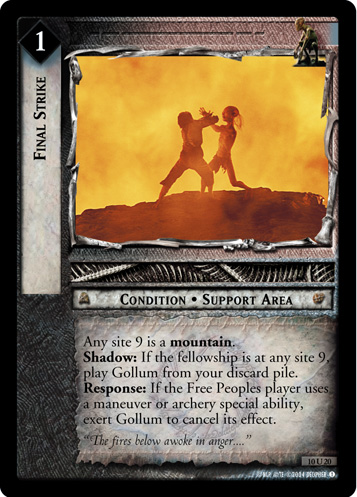 is a powerful tool to shut down a variety of obnoxious Free Peoples abilities. The effects at site 9 are rarely relevant.
is a powerful tool to shut down a variety of obnoxious Free Peoples abilities. The effects at site 9 are rarely relevant. - Unabated in Malice (10C24)
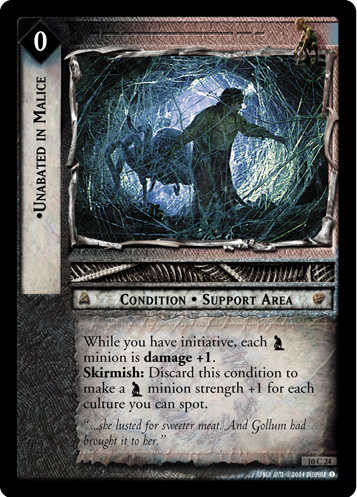 boosts Shelob and any Gollum that can win skirmishes. It's also a (predictable) pump for either of them, well-suited to a deck that is just splashing
boosts Shelob and any Gollum that can win skirmishes. It's also a (predictable) pump for either of them, well-suited to a deck that is just splashing Gollum culture cards because it looks at both sides of the table. It's almost certainly at least +2, but could turn out to be much more in or against a rainbow deck.
- Led Astray (11U45)
 is a powerful site-manipulation tool. It can be used to switch the current site or the next site, but unlike most site manipulation cards, it can also be used to switch out an older site so you can replay it later. The fact that it also adds 3 Twilight means it's never a dead draw, even when the site path is perfectly arranged to your liking.
is a powerful site-manipulation tool. It can be used to switch the current site or the next site, but unlike most site manipulation cards, it can also be used to switch out an older site so you can replay it later. The fact that it also adds 3 Twilight means it's never a dead draw, even when the site path is perfectly arranged to your liking. - Treacherous Little Toad (12U41)
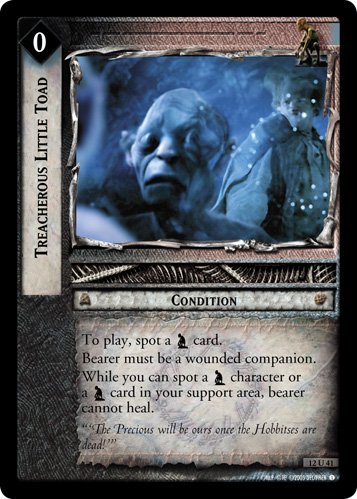 is a stronger version of cards like Black Breath (1U207)
is a stronger version of cards like Black Breath (1U207)
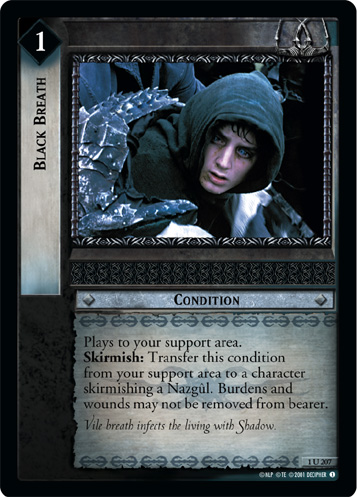 or You Bring Great Evil (1C283)
or You Bring Great Evil (1C283)
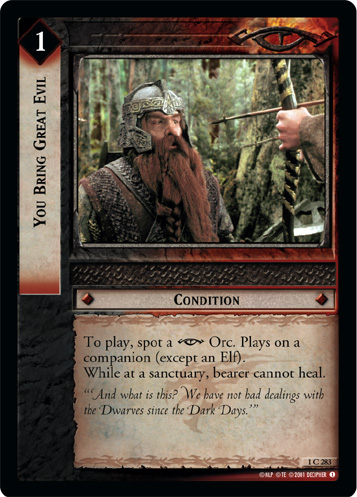 . It can be played on the Ring-bearer, locking in wound tokens from Gollum, Dark as Darkness (9R+28)
. It can be played on the Ring-bearer, locking in wound tokens from Gollum, Dark as Darkness (9R+28)
 , or simply to supplement a direct wounding strategy.
, or simply to supplement a direct wounding strategy. - Cunningly Hidden (13U45)
 is part of a cycle of similar pump events, but notable in that, like Naked Waste (13U53)
is part of a cycle of similar pump events, but notable in that, like Naked Waste (13U53)
 , it can remove both Free Peoples and Shadow
, it can remove both Free Peoples and Shadow Gollum culture cards to pay for recurring it.
- Deceit (18R29)
 protects your other Shadow
protects your other Shadow conditions from being discarded. It can't protect itself, although with two copies in play, they can protect each other. (Note that the PC Errata makes Deceit unique, as well as more expensive to use.) Any card that generates at least one Twilight and discards one condition, like Secret Sentinels (2R20)
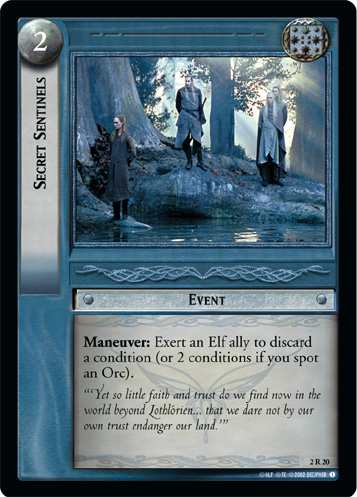 or Company of Archers (4R61)
or Company of Archers (4R61)
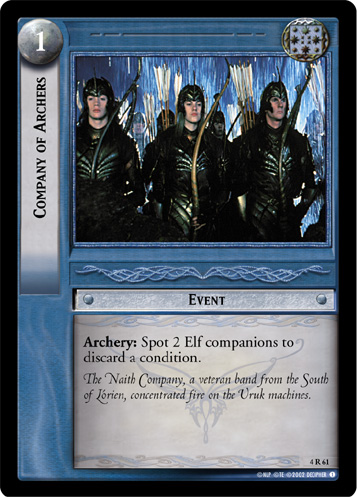 , is helpless against it.
, is helpless against it. Gandalf culture condition sweepers like Sleep, Caradhras (1C84)
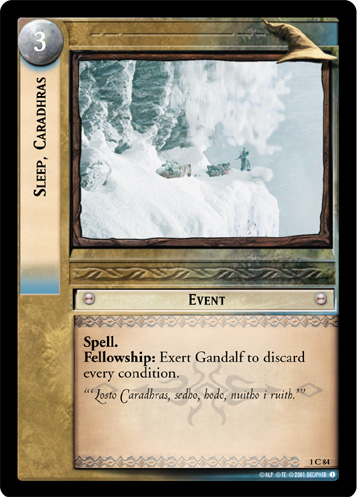 , Grown Suddenly Tall (4R92)
, Grown Suddenly Tall (4R92)
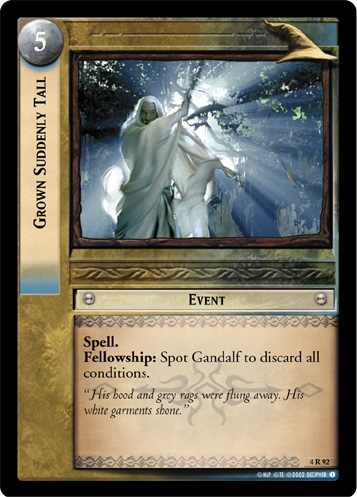 , and especially Deep in Thought (3C30)
, and especially Deep in Thought (3C30)
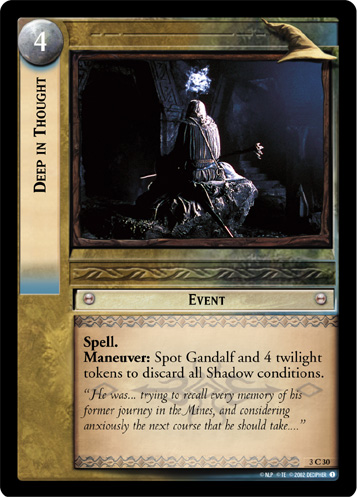 only discard a few of your least-useful conditions at best. Cards that persist in play, like Galadriel, Lady Redeemed (10R11)
only discard a few of your least-useful conditions at best. Cards that persist in play, like Galadriel, Lady Redeemed (10R11)
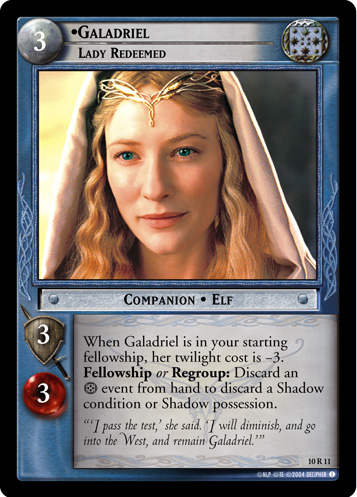 , Namárië (17U10)
, Namárië (17U10)
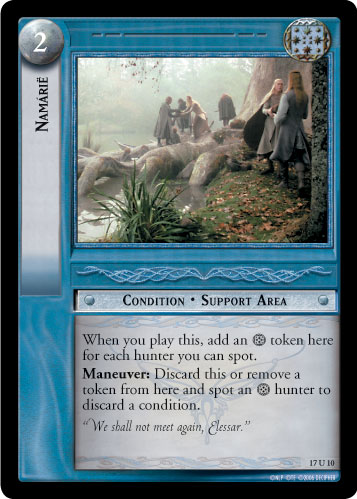 , and Bilbo, Well-spoken Gentlehobbit (2U96)
, and Bilbo, Well-spoken Gentlehobbit (2U96)
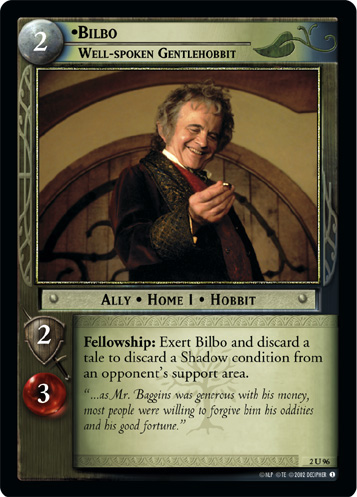 can sometimes work against Deceit, depending on how you manage your Twilight. Deceit also can't protect against sites that discard conditions or cards that remove conditions from play without discarding them, like Vilya (3R27)
can sometimes work against Deceit, depending on how you manage your Twilight. Deceit also can't protect against sites that discard conditions or cards that remove conditions from play without discarding them, like Vilya (3R27)
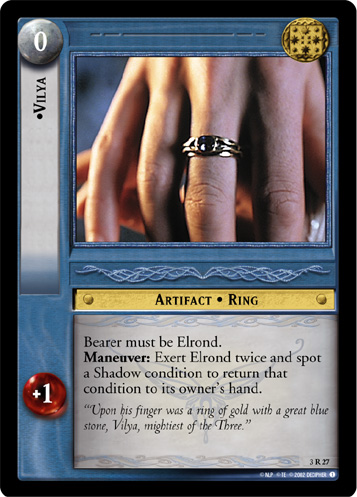 and Gladden Homestead (13R49)
and Gladden Homestead (13R49)
 .
.
Notable sites[edit]
site manipulation, mention the nasty sites
King Block[edit]
- City of the Dead (8U118)
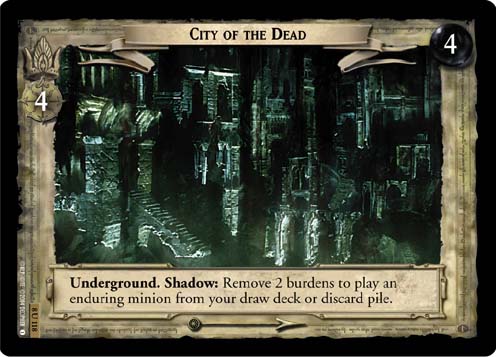 is one of the few cards that can tutor or recur Shelob, albeit at a fairly high price.
is one of the few cards that can tutor or recur Shelob, albeit at a fairly high price. - Northern Ithilien (7U359)
 recurs Gollum and places some burdens, at the low price of a few threats. If you have Fat One Wants It (7R57)
recurs Gollum and places some burdens, at the low price of a few threats. If you have Fat One Wants It (7R57)
 out, one of those threats will be replaced immediately anyway. There's also a corruption bomb combo possible using this site. Play Evil-smelling Fens (5U22)
out, one of those threats will be replaced immediately anyway. There's also a corruption bomb combo possible using this site. Play Evil-smelling Fens (5U22)
 , stack up threats, then any version of Gollum at this site (ideally using the site's text). If you don't already have threats stacked, Plotting (7R67)
, stack up threats, then any version of Gollum at this site (ideally using the site's text). If you don't already have threats stacked, Plotting (7R67)
 can help. Then, play Watcher in the Water, Keeper of Westgate (2R73)
can help. Then, play Watcher in the Water, Keeper of Westgate (2R73)
 , which will discard Gollum. (A second copy of Evil-Smelling Fens can help pull the Watcher out of your discard pile.) At this point, play Gollum over and over using the site's text, placing two burdens and immediately discarding Gollum each time. This combo can stack up as many burdens as you can get threats, usually up to the size of the Fellowship.
, which will discard Gollum. (A second copy of Evil-Smelling Fens can help pull the Watcher out of your discard pile.) At this point, play Gollum over and over using the site's text, placing two burdens and immediately discarding Gollum each time. This combo can stack up as many burdens as you can get threats, usually up to the size of the Fellowship.
Post-Shadows[edit]
- Dammed Gate-stream (11U235)
 allows cards using Sméagol to quickly set up using One Good Turn Deserves Another (11U49)
allows cards using Sméagol to quickly set up using One Good Turn Deserves Another (11U49)
 or Something Slimy (15U50)
or Something Slimy (15U50)
 .
. - Mere of Dead Faces (11U246)
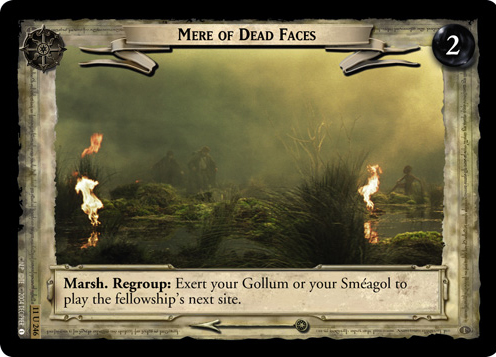 helps
helps Gollum decks on either side manipulate the site path.
- Dol Guldur (17U145)
 is culture-agnostic condition removal for your Shadow side. One thing
is culture-agnostic condition removal for your Shadow side. One thing Gollum culture entirely lacks is condition removal.
- Foot of Mount Doom (18U135)
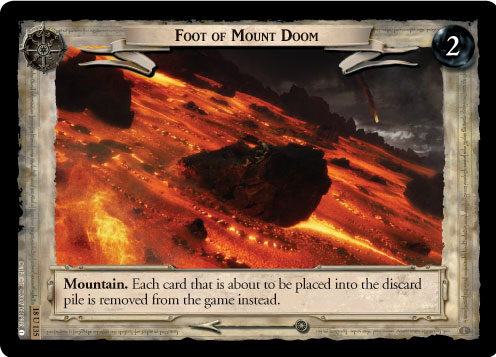 harshly punishes Gollum decks that rely on recurring key cards over and over. Don't let your opponent toss key cards or your copies of Gollum into the fire if you can avoid it.
harshly punishes Gollum decks that rely on recurring key cards over and over. Don't let your opponent toss key cards or your copies of Gollum into the fire if you can avoid it.
| Cultures | |||||||
|---|---|---|---|---|---|---|---|
| Free Peoples | |||||||
| Movie-era Shadow | |||||||
| Shadows-era Shadow | |||||||
